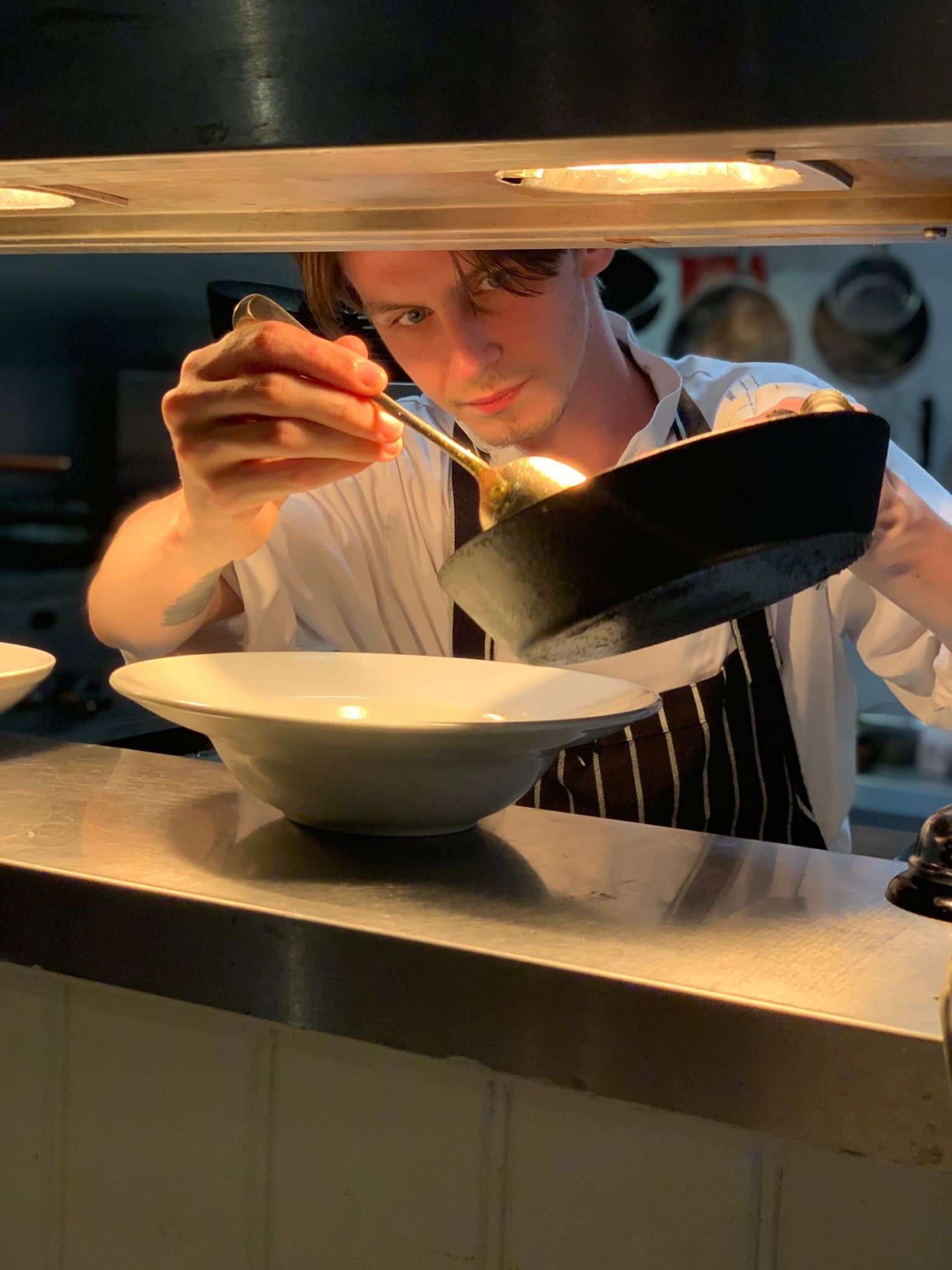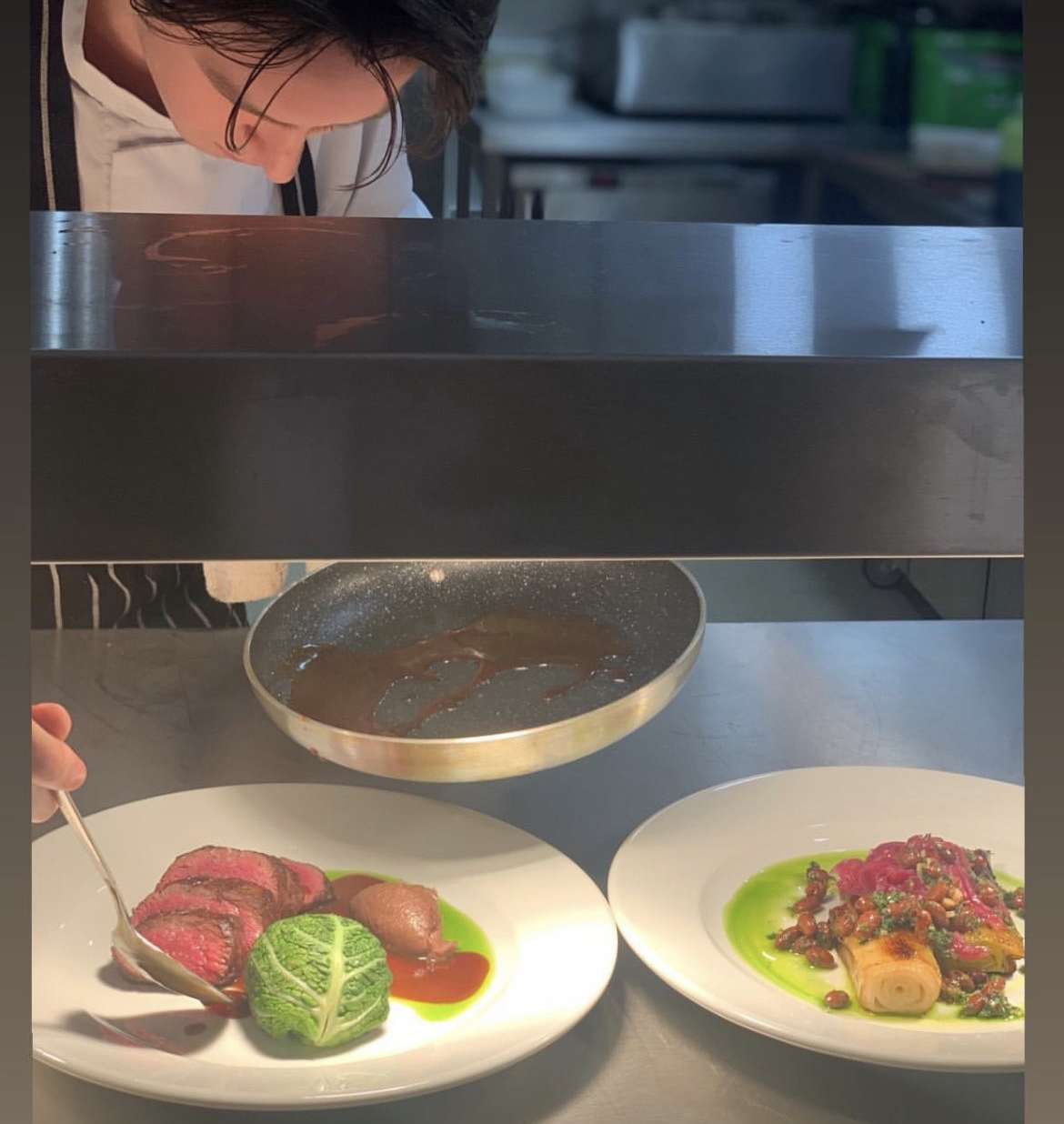Our Academy Restaurant played host to a wonderful celebration of #BlackHistoryMonth this month that also helped to mark the launch of its new tasting menu.
Level 3 cookery students, guided by the expertise of the brilliant chef Ian Jaundoo, embarked on a culinary journey that was as inspiring as it was delicious. In honour of Black History Month, they curated a 6-course tasting menu inspired by the vibrant flavours of African and Caribbean cuisine. This menu was the star of an invite-only private dining event, featuring guests from local media, influential figures, and foodie enthusiasts.

The evening ended with powerful words from change-maker Afiya Amesu, whose mission is to drive equality and diversity in the workplace. Her emphasis on the importance of allyship set a poignant tone for the night.
Our Principal, Elaine Bowker, highlighted the significance of the event, saying, “The City of Liverpool College remains committed to fostering a spirit of togetherness and celebrating the rich cultural tapestry that Black History Month represents. This gathering is a testament to our dedication to culinary excellence and our commitment to celebrating and championing diversity and inclusivity.”

The event drew not only media and local diversity leaders but also local foodie content creators, including @tamtalizatv, who is a former COLC student with over 1 million fans across socials, and the talented duo, Bish and Liv from @craveandcapturee.
Black History Month, established in 1987 on the 150th anniversary of Caribbean emancipation, raises awareness of significant names and events in the history of people of African and Caribbean descent. The celebration was marked by a specially crafted African and Caribbean inspired menu, expertly prepared by our student chefs under the guidance of Executive Chef Ian Jaundoo.

Our Academy Restaurant’s new tasting menu offers a wide array of options, inspired by cuisines from around the world. We’ve carefully selected a panel of well-established and experienced chefs from the region to collaborate with our students, providing them with access to leading industry talent to develop their cookery and dining skills to an industry-standard level.
Every Thursday evening, our student chefs expertly prepare dishes using high-quality, locally sourced ingredients, guided by one of the selected professional chefs. These tasting menus are available starting from £35 per person.
Our Academy Restaurant is nestled on Tradewind Square off Duke Street, providing a unique backdrop in the heart of Liverpool’s historic Ropewalks.
Results Day: Congratulations to the ‘Class of 2023’The City of Liverpool College extends huge congratulations to the ‘Class of 2023’ for their Level 2, 3 and 4 results!
Here at The City of Liverpool College, we understand just how important results are to both young learners and their parents. We couldn’t be prouder of our students – they’ve shown incredible determination, drive and ambition and we can’t wait to see what they achieve next.
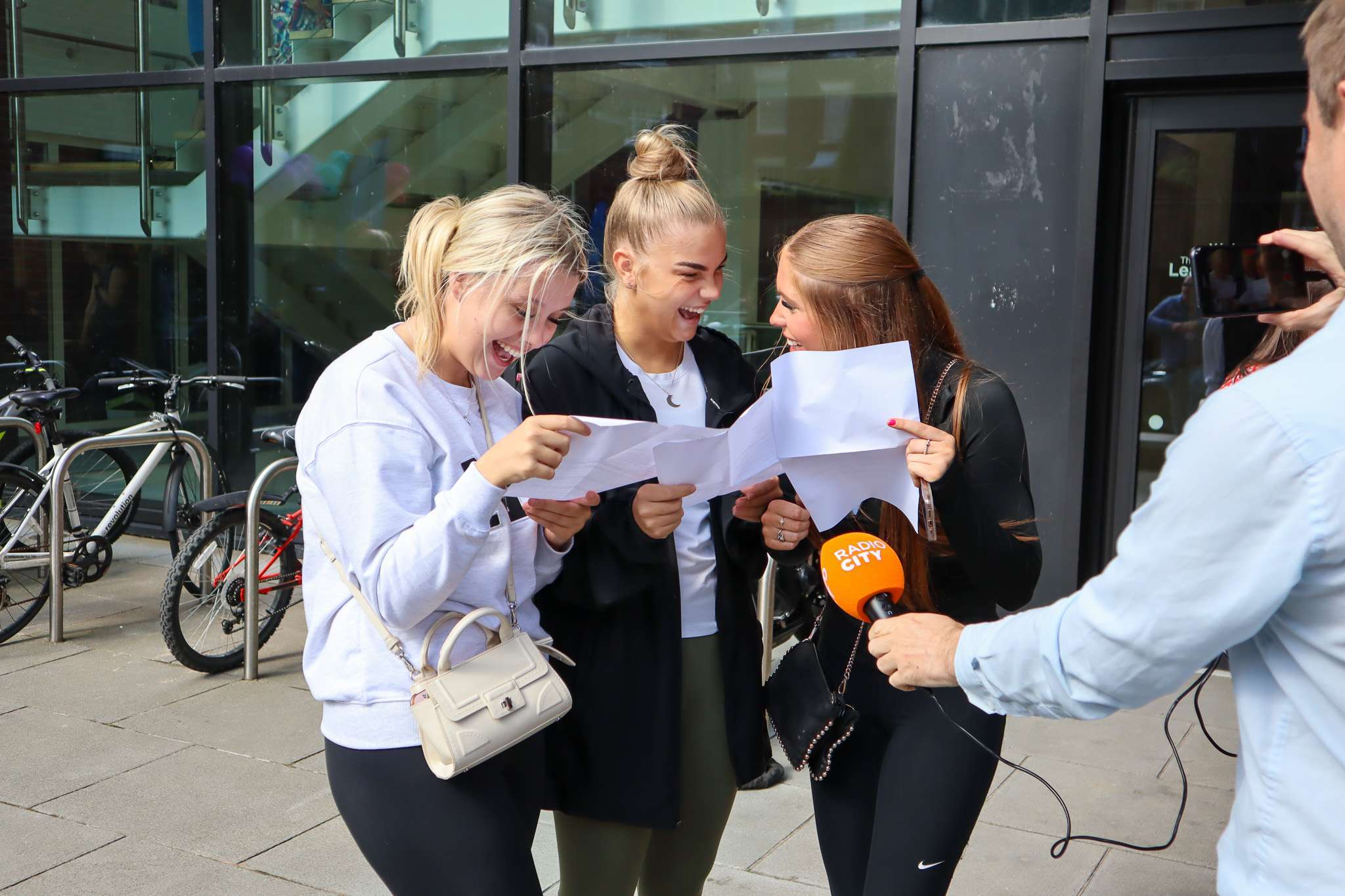
Securing three or more substantial qualifications isn’t just a piece of paper; it can be a key that unlocks the door to a learner’s next big adventure. As a leading national further education provider for over 12,000 students across the Liverpool City Region and beyond, we offer one of the most diverse and comprehensive academic and vocational curriculums around.
Our mission? Simple yet impactful: we’re all about delivering top-notch skills and education, as well as supporting every student who comes through our doors to achieve. Our aim is to fuel growth and provide opportunities not only for individuals but also for businesses across the Liverpool City Region.


19-year-old Sleiman Darwish, who is originally from Syria, and is also one of the College’s student governors, couldn’t stop smiling after securing top marks for his IT qualification.
Speaking with the Liverpool Echo, he said the grade came as a surprise as the exams were “really tough”. He is now planning for university.
“I’m really happy, really excited. I got more than what I expected. I was going for a Distinction in my Level 3 NVQ IT qualification, but today I’m really happy to get the highest grade possible – Distinction Star.”
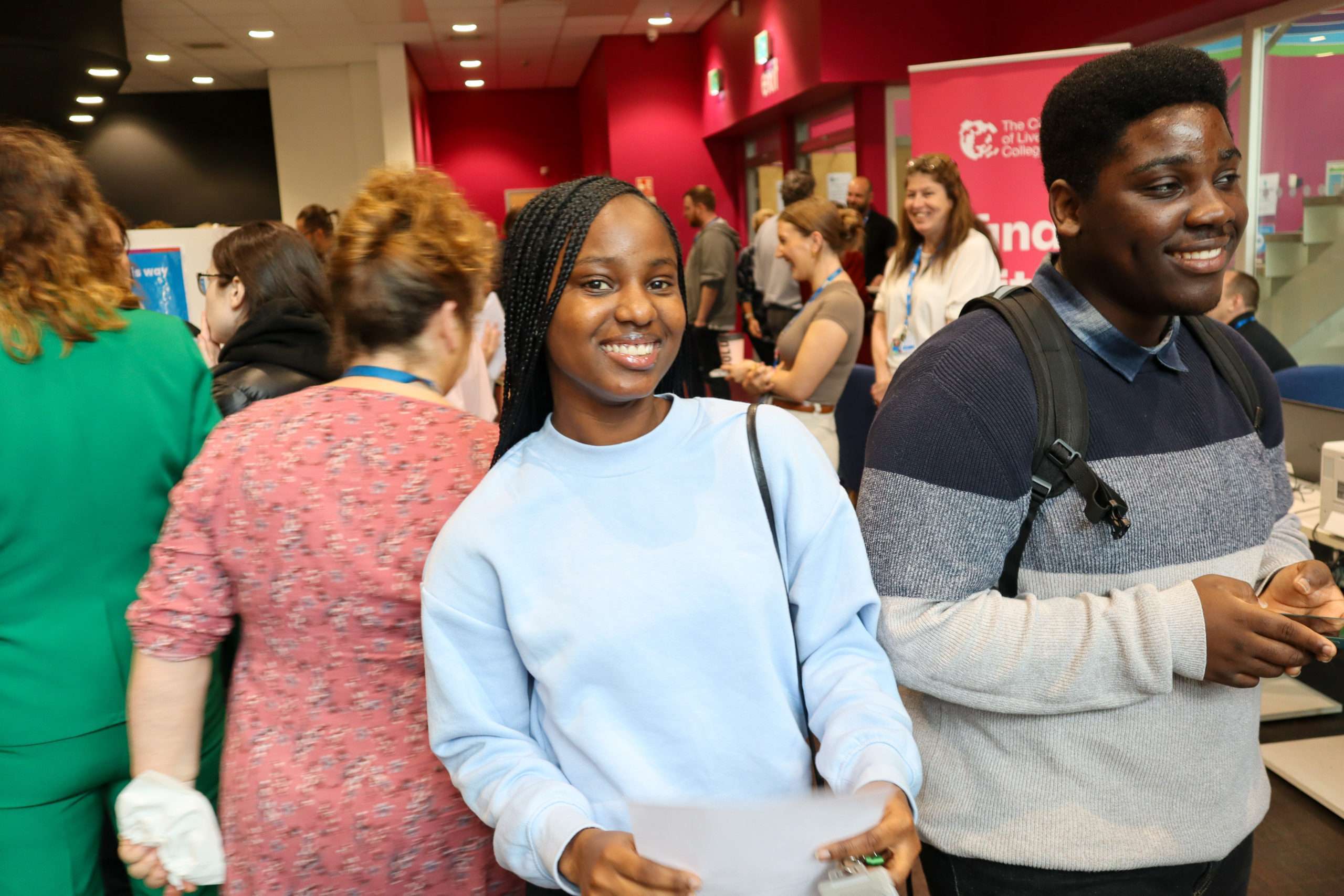
Dinna Daniel, 18, wants to be a horror film director after landing a distinction in her Level 2 Media Studies.
“I was scared when I was getting them but when I saw it couldn’t believe it! It’s been a difficult time to study but I’m going on to study my Level 3.”

Rab Martin, 18, collected her marks for GCSEs. Rab was sitting formal exams for the first time, having previously been home-schooled.
She said: “It’s been a pretty difficult year and I was really anxious this morning, but it was a huge relief when I saw my results. I’ve had to adapt, and I’ve done all I can, I’m really pleased!”

Nathan Rigby, a 20 year-old from West Derby also spoke to the Liverpool Echo. He was delighted with his grades, securing top marks in his Level 3 IT Diploma. which will enable him to complete a supported internship at Broadgreen Hospital.
Nathan said: “It gives people with special complex needs like me the chance to build up work skills naturally and get into what we want to do, and how that career field works in general.
“I will have someone that will monitor me and support me as I do this internship. We can then take these skills into a real work environment in the future. I feel like, if I went into a career field without those workers, I’d really struggle.”

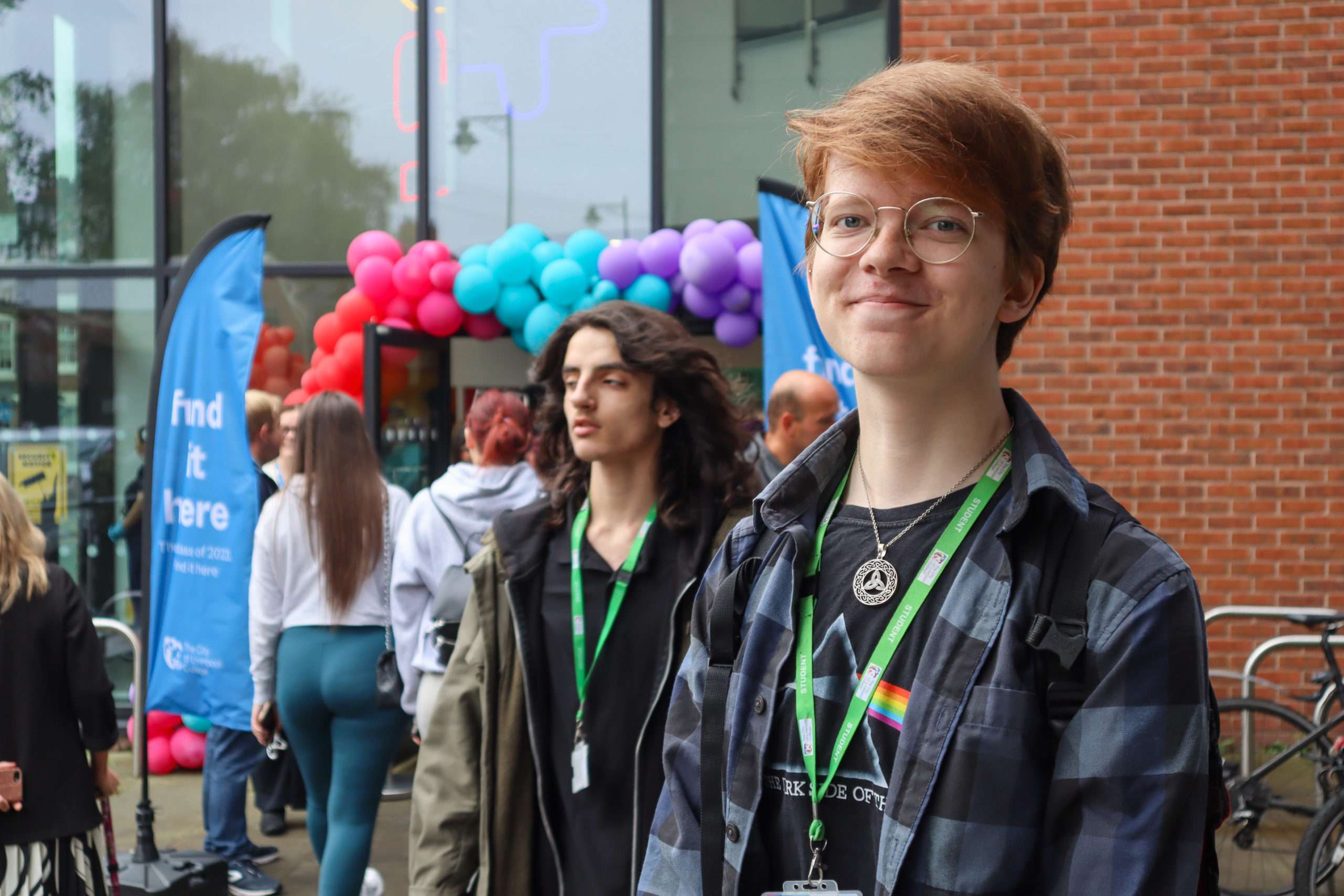
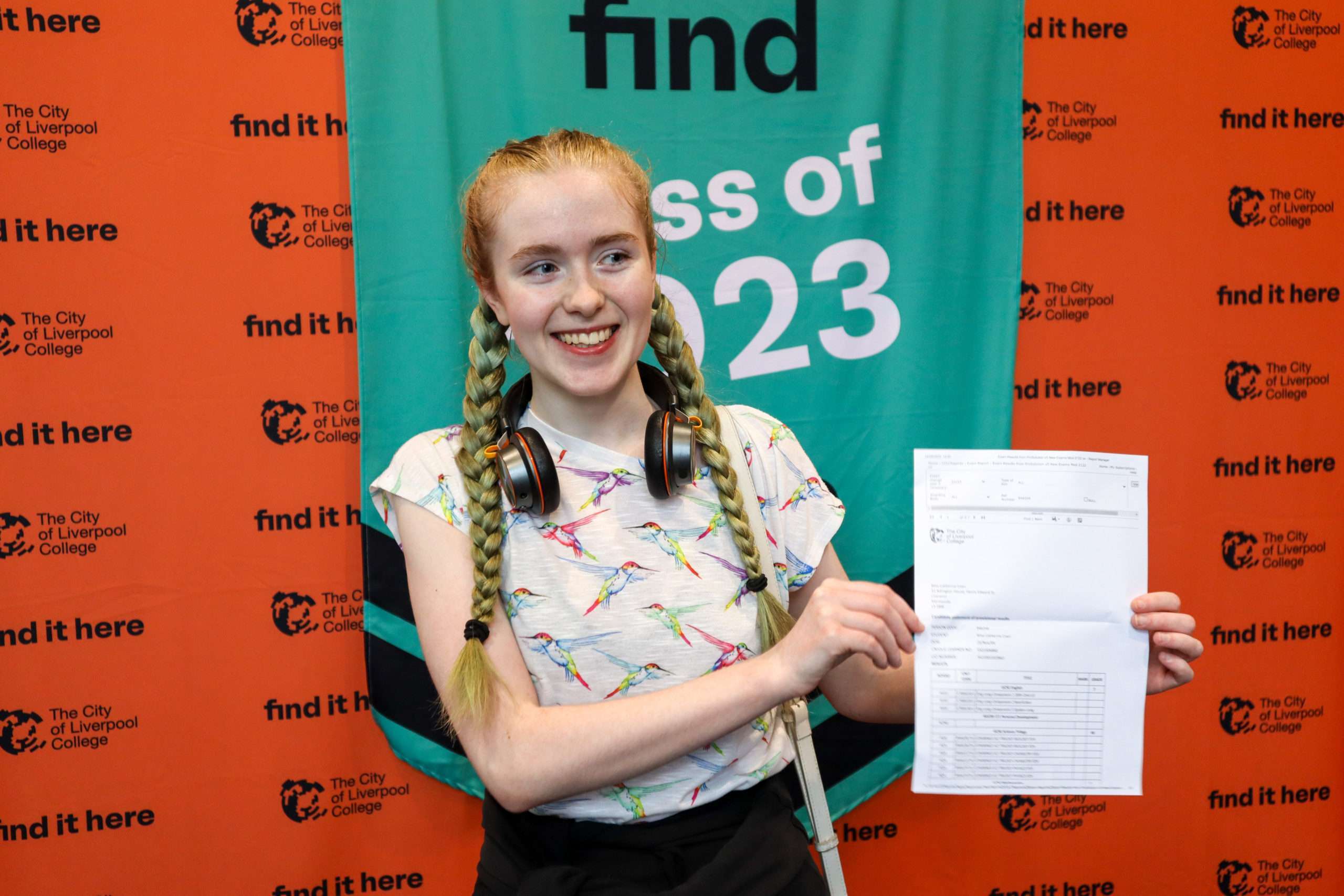



We’re excited to be partnering with the National Council for Training of Journalists (NCTJ) on a new scheme aimed at helping hundreds of young people from disadvantaged backgrounds into careers in journalism.
The scheme sets out to encourage 14-to-18-year-olds from disadvantaged backgrounds and lower social economic groups to enter the field of journalism and to ensure the next generation of journalists is more representative of the wider population.
As part of our commitment, the College will be supporting 25 young people, showing there are alternative routes into journalism other than university and how journalism can be a creative, rewarding, challenging, and exciting career path.
Our school of journalism already boasts an impressive track record of preparing journalists in their early careers, with graduates going on to secure impressive roles in the industry including working with the BBC, ITV, The Metro, The Independent, and many others.

The College has proudly taught journalists for over 30 years and offers the only stand-alone course in Merseyside to be officially accredited by The National Council for the Training of Journalists (NCTJ).
The NCTJ is the oldest and most established journalism qualification in the UK and remains the industry standard for those looking to break into the industry.
Our Level 5, 18-week fast track diploma course is industry recognised, includes guaranteed work experience with a local newsroom, features guest lectures and is taught by expert tutors, making it the only course you need to become a qualified multimedia journalist.

One of last year’s students, Conal Cunningham, was awarded with the Newsquest essential journalism prize, for achieving some of the best results in the country.
Whether you’re interested in sports, music, local issues, business, or national broadcast, the NCTJ Level 5 Diploma delivers it all and includes training in media law, public affairs, shorthand, video journalism and more.
The NCTJ diploma is an excellent route for graduates who want a career in journalism or is a great alternative to university for those who are aged over 18.
Some of our graduates include:
Sally Nugent, Presenter for BBC Breakfast
Jess Phillips, Senior Showbiz Reporter for the Daily Star
Richard Hartley-Parkinson, Executive Editor at Metro UK
Robert Goulding, Reporter for the Warrington Guardian
Steve Graves, Executive Editor Digital at Liverpool Echo
James McNeill, Reporter for the Liverpool Echo
Sara O’Hara, Reporter for the Daily Star
Caoimhe O’Neill, LFC Writer for The Athletic
Remy Greasley, Reporter for the Liverpool Echo
Matt Jones, Sports Writer and Podcaster at the Blue Room
Partick Boyland, Everton FC Writer for The Athletic
If you’re looking to pursue a career in the media, our Journalism School is a great place to start.
To find out more about our fast-track NCTJ accredited course starting in September, click here.
Eurovision 2023 NewsThis year’s Eurovision Song Contest was the first time in 25 years that the UK has staged the event, which was hailed as a triumph for Liverpool, who hosted Saturday’s biggest music festival on behalf of war-torn Ukraine.
Our amazing students and staff were involved in a whole host of exciting activities throughout Eurovision 2023, details of which can be found below.
Our Ukrainian students and staff were interviewed about life at the College, their experiences of Liverpool and the preparation for Eurovision in May 2023. Our Media department brought the images and recordings together in a short film.
Our very own Ukrainian staff and students are the stars of the video, which is dedicated to Ukraine, Eurovision and Liverpool. The images and recordings were brought together by our media department into a fantastic piece of work that is testament to how much the College has worked with the amazing Ukrainian community to make this festival an event to remember.
We’re incredibly proud of them and hope you’ll take the time to enjoy this very moving and inspirational video.

As guests of Culture Liverpool, Jan Schofield and two of our Ukrainian students, Diana Almselm and Evangelina Zamula, joined Rev. Dr. Taras Khomych at the M&S Arena on Saturday for the final rehearsals of Eurovision’s main event.
Evangelina – who proudly wore her Ukrainian national dress – and the group, soaked up the arena’s electrifying atmosphere, and also enjoyed the live performances of twenty-six finalists as they prepared for the dazzling night of entertainment, which was watched by millions of Eurovision fans from around the world.
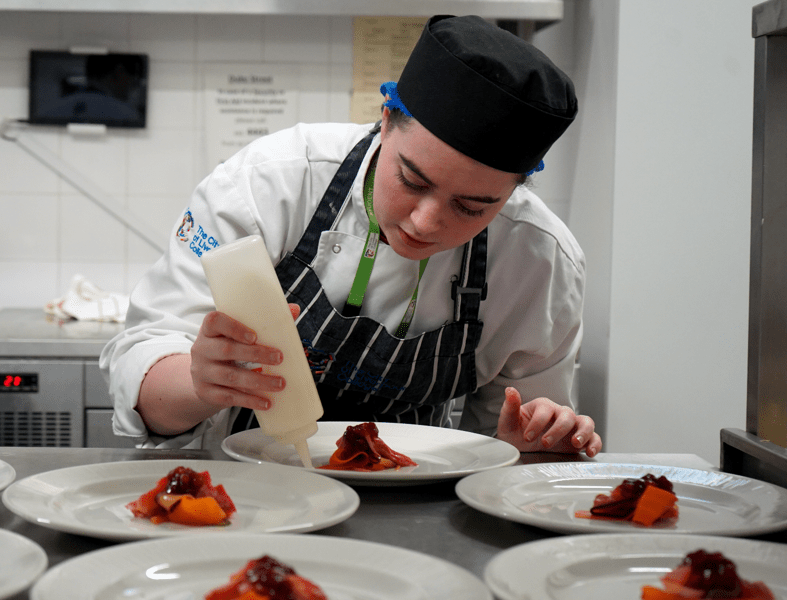
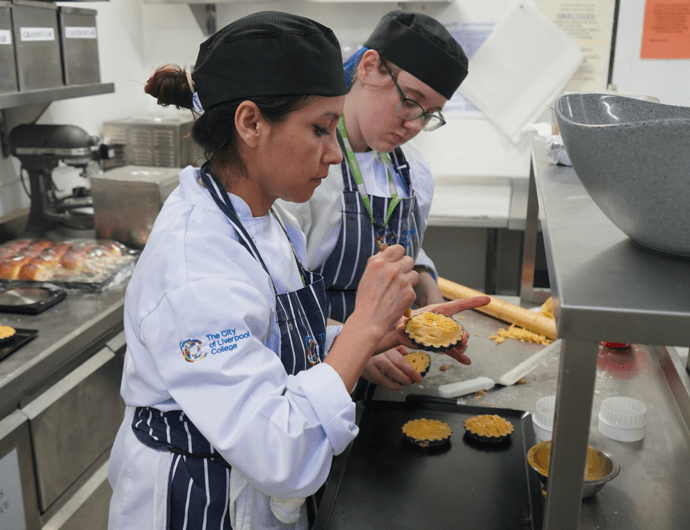
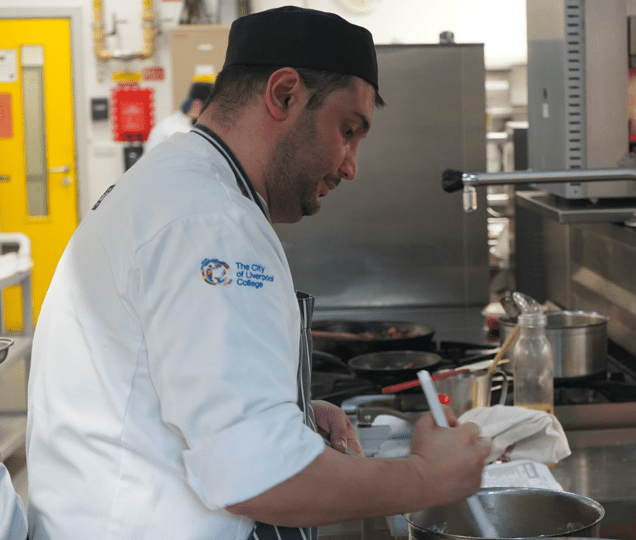

On 20th April, we hosted an incredible Eurovision-themed tasting menu event at The Academy Restaurant at our Duke Street campus. This exclusive seven-course menu, where each course was inspired by a country linked to Eurovision success, was extremely popular with our guests. The full menu was prepared by the College’s talented hospitality students, under the expert guidance of specialist teaching staff.

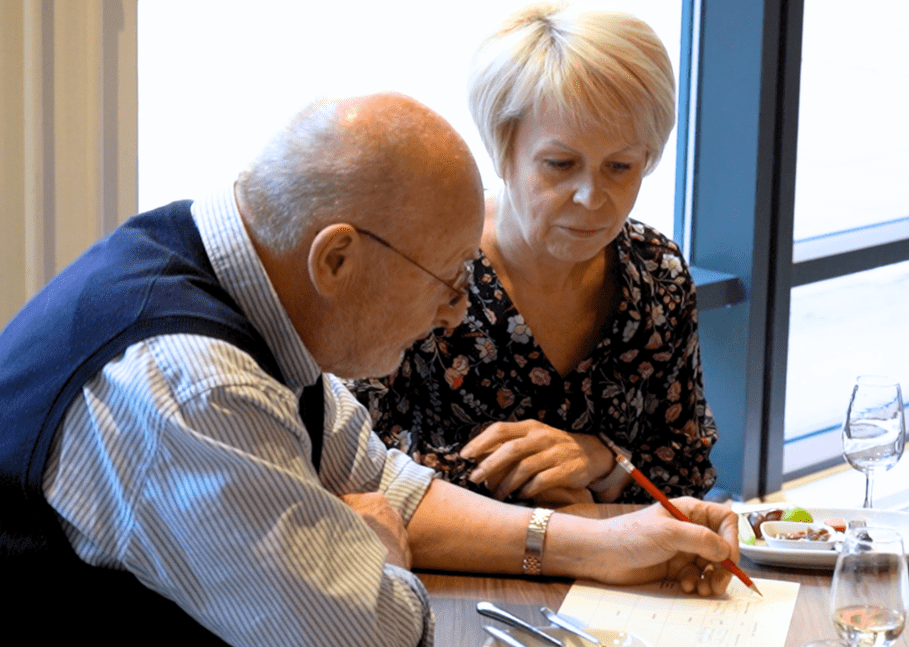
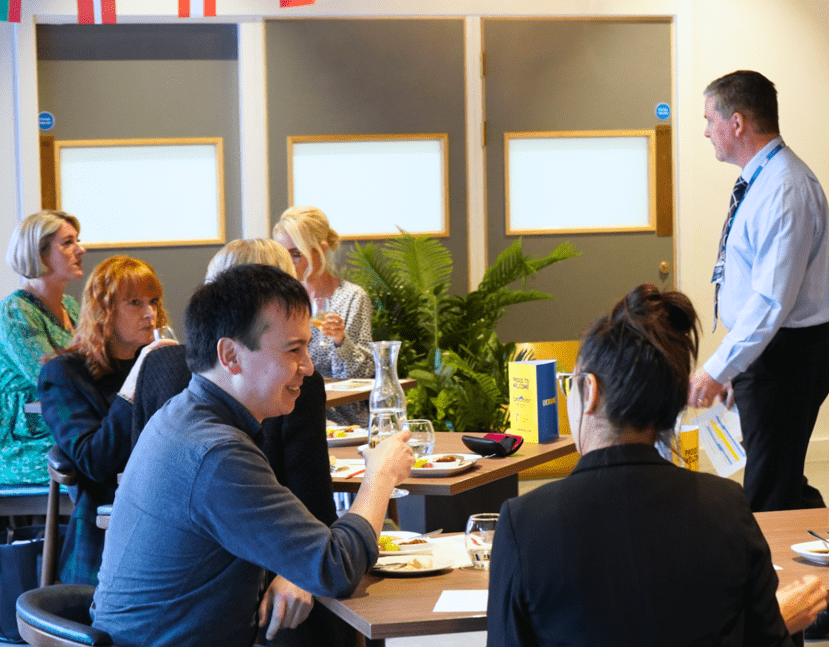
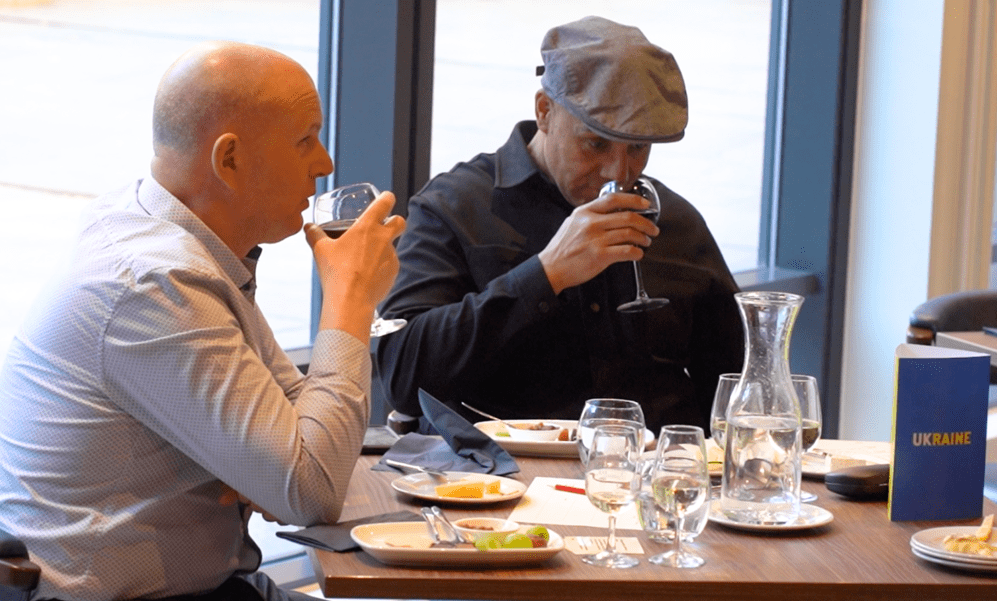
Guests were taken on a delectable journey around the UK, tasting a selection of first-class cheeses from across the counties of England, Wales, Scotland and Northern Ireland.
In collaboration with the renowned Liverpool Cheese Company, our budding connoisseurs were invited to taste and explore four cheeses from each of the country’s independent cheese producers, served with an array of artisan accompaniments, and paired with a European wine chosen to complement and enhance the cheese.
The event, which was hosted by the College’s talented hospitality students, under the expert guidance of specialist teaching staff, was a great success in what turned out to be a fun, relaxing evening for all involved!


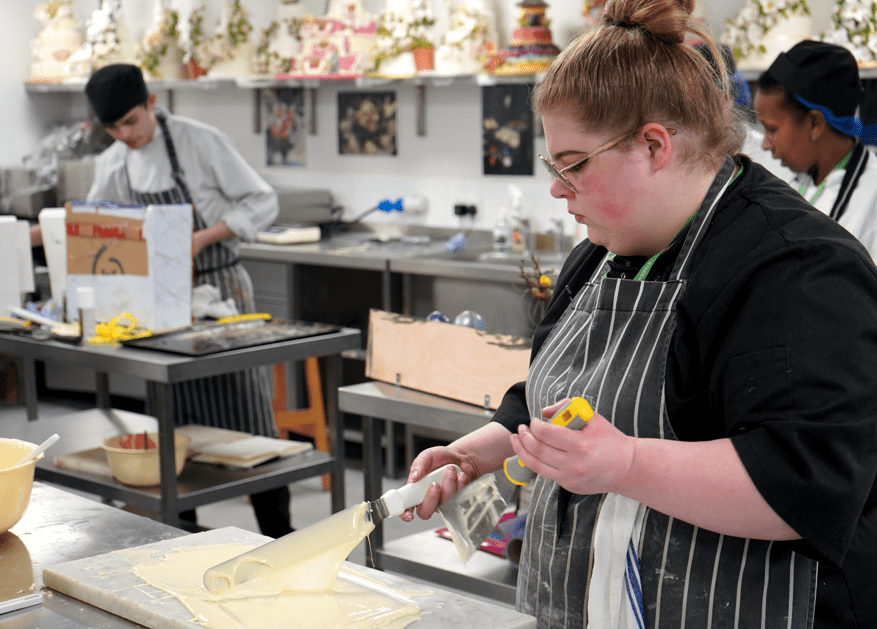

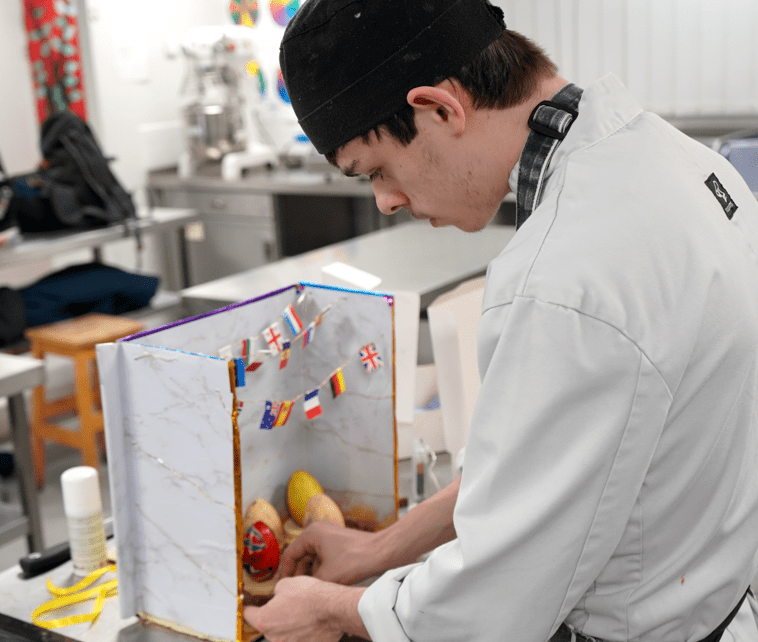
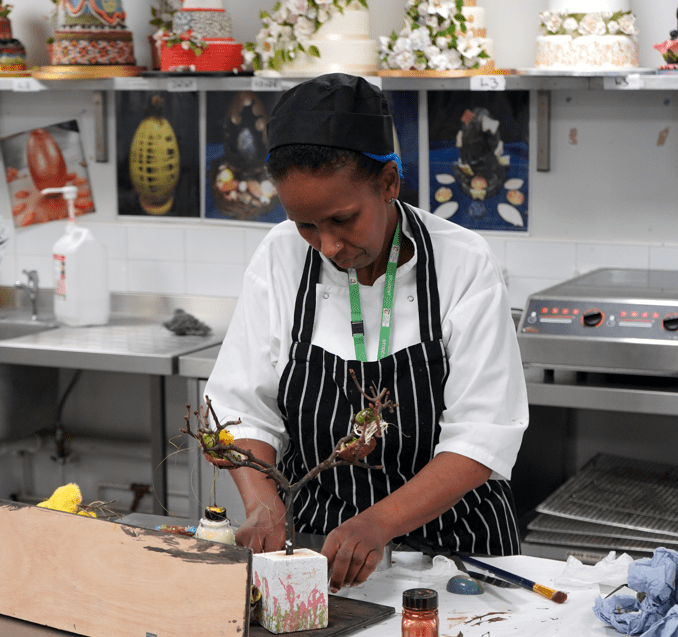
As part of our Eurovision preparations over the last few months, three members of the Ukrainian community visited our specialist patisserie students to talk about Ukraine and how much Easter means in their country. The students produced decorative eggs to showcase in a virtual gallery during this celebratory period.
The eggs are currently on display in John Lewis, Liverpool ONE. Make sure you pop in to see their masterpieces for yourself!

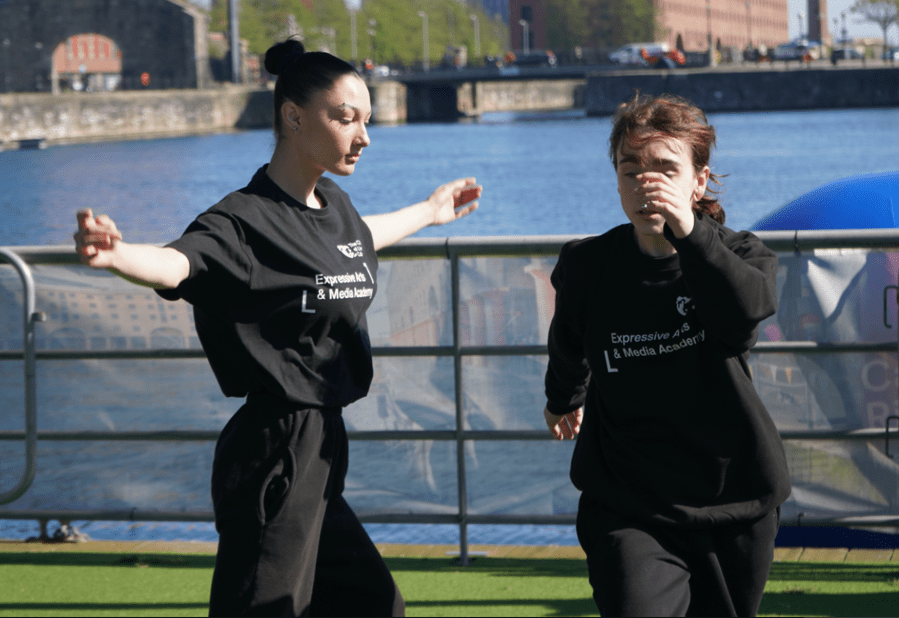
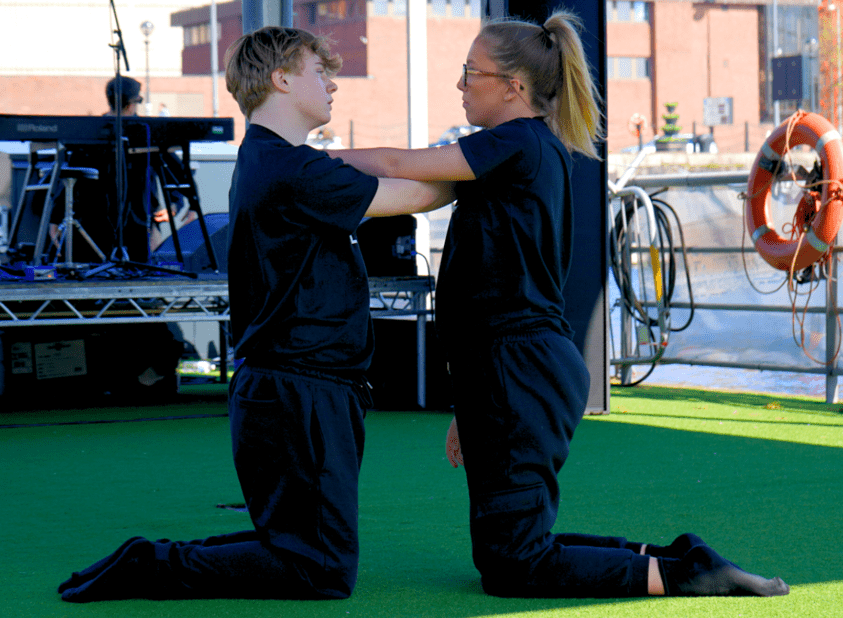



As part of the Eurovision celebrations, our amazing performing arts students take part in a series of exciting performances on the floating platforms at Salthouse Dock and Chavasse Park on the following days:
Salthouse Dock:
Chavasse Park:
Come along and see some amazing performances and support our students! No tickets needed.
While you’re there, keep an eye out for artwork from our Creative Arts & Fashion students and Students’ Union on display nearby. They’ll be decorating pebbles close to the arena in the form of a giant sunflower!
Completed artwork ready to view from 12th May.
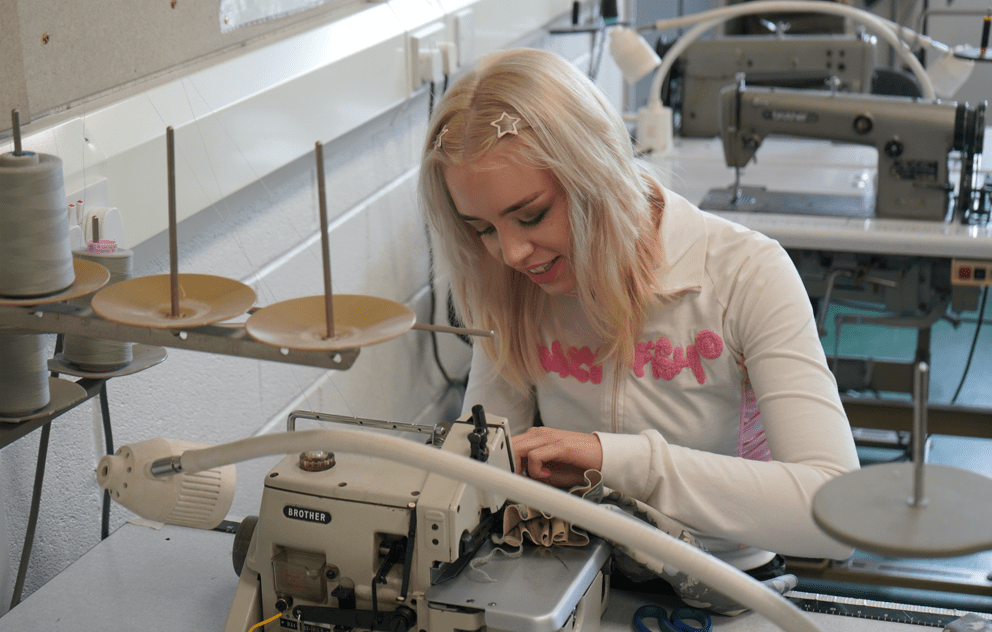
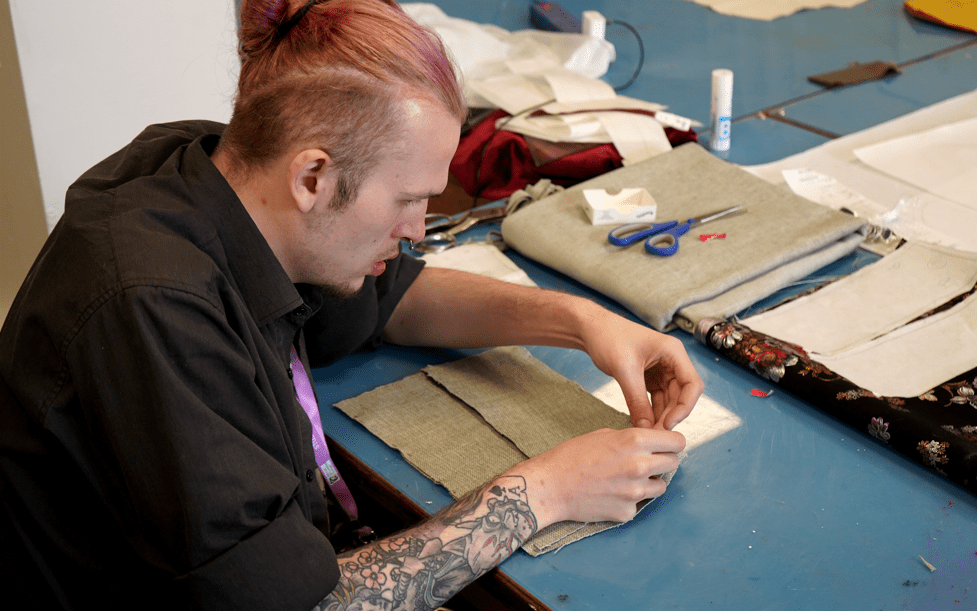
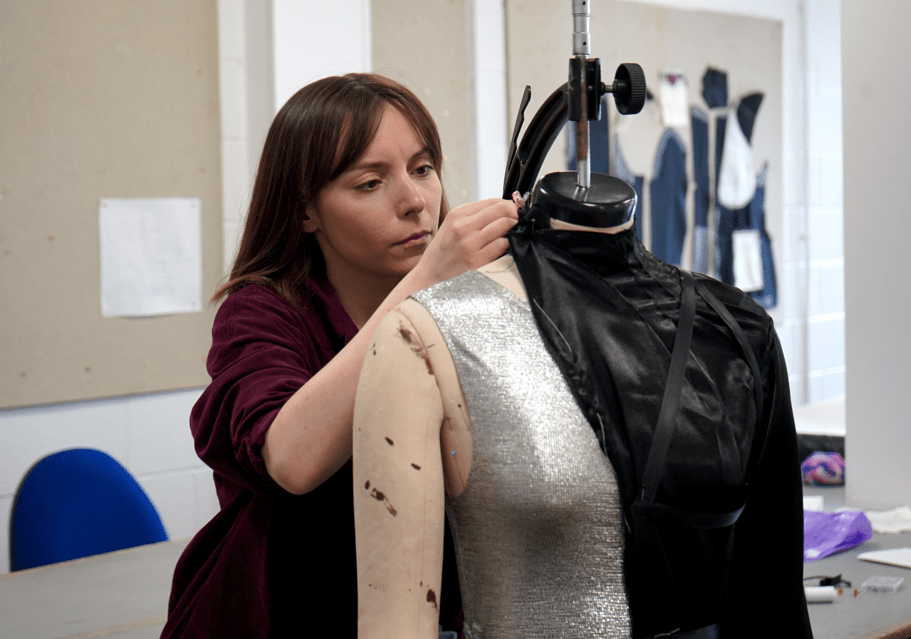
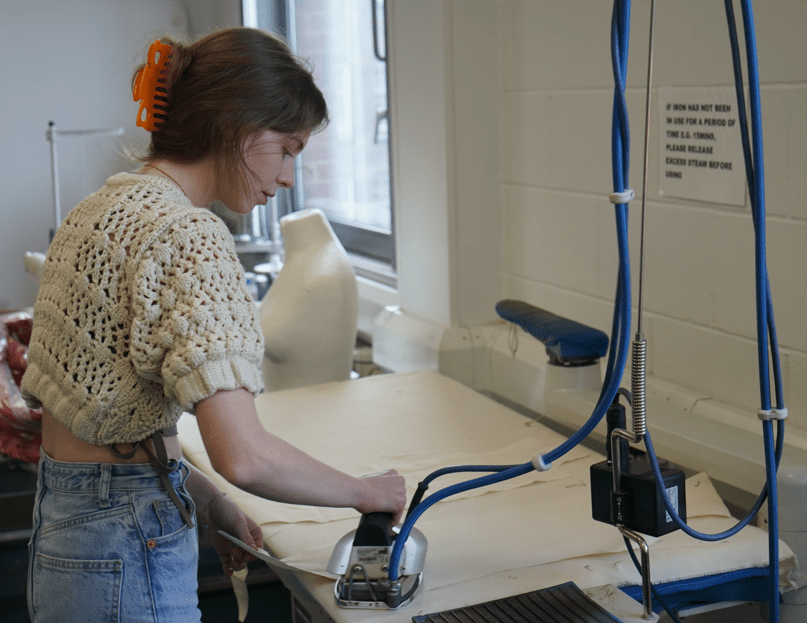



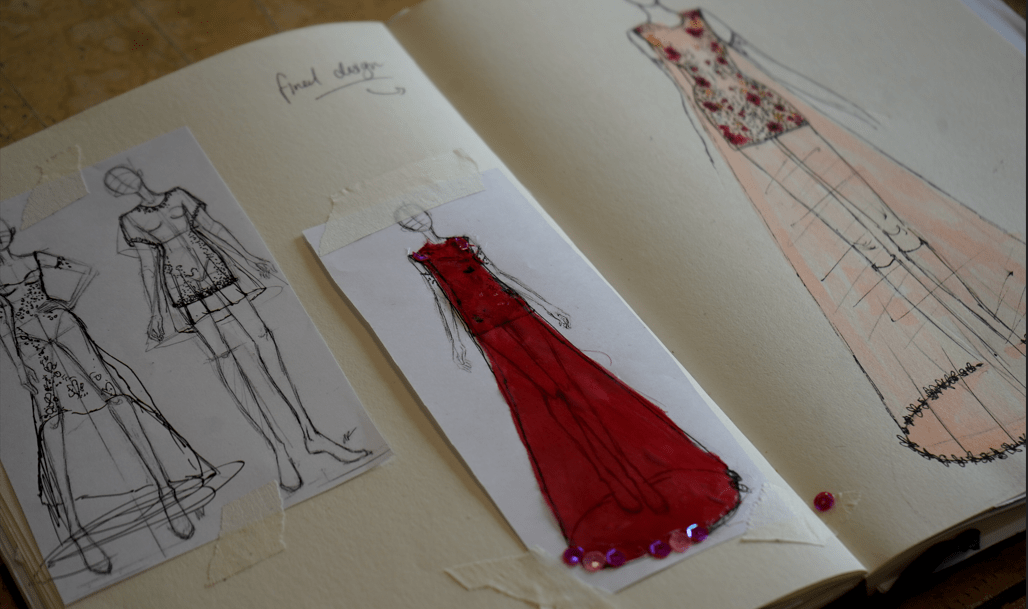
Our HNC Fashion students finalised their Eurovision-themed project on Friday 20th April, designing and producing twelve garments based on the theme of Eurovision. They were encouraged to be bold with their creations and the results look incredible!
One of the students produced a fully sustainable costume for the project. His initial design research took him to charity shops in the local area, looking at shape and fabrics. He bought several samples which he went on to deconstruct and use as patterns. Old newspapers were utilised to make his pattern blocks and recycled buttons were used to accessorise. The student’s final garments are constructed from old curtains, from which the lining was removed to make his initial toiles (test version of a garment before a designer makes it in the real fabric).
A number of the garments are now on display at the British Music Experience and John Lewis (ground floor), Liverpool ONE, please do pop in to have a look at the amazing results! Take pictures, and don’t forget to tag us on social media – @colcollege!

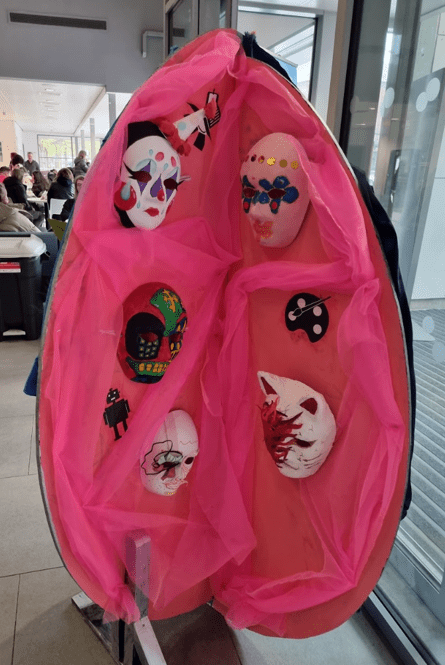
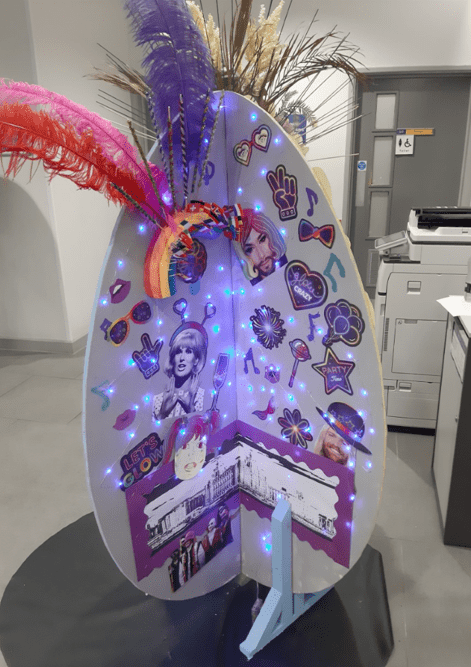
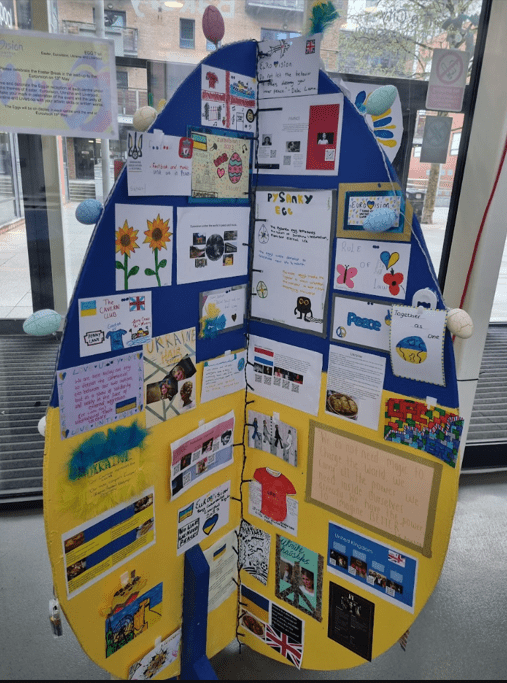
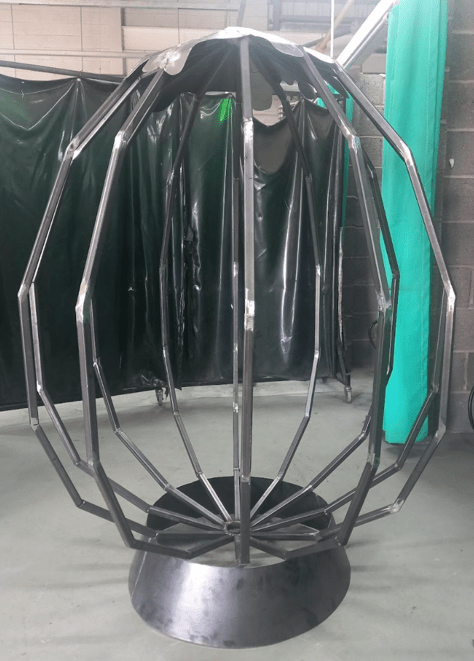
Based on the theme of Eurovision, students at each of our five college campuses decorated a huge egg to go on display in each reception areas. The eggs all took on a 3D shape, with the form crafted in metal at our Construction and Engineering site on Vauxhall Road!
The Students’ Union, welding, art & design, academic studies and travel & tourism students decorated the eggs, which are approximately 1.5m x 1m in size, and will remain on display during the lead up to and throughout Eurovision.
Find out more about Culture Liverpool’s Eurovision Egg Trail project with local primary schools here, which was the inspiration behind this Students’ Union-led activity.


The College’s Arts Centre will host a school arts festival during week commencing 8th May. Schools will create a piece of artwork, dance, acting, music, film or digital creation to be showcased in the theatre and gallery at the Arts Centre in the run up to Eurovision. The pieces will all be created under one theme, ‘Eurovision United’, and bring together primary, secondary and other FE providers in an extravaganza of culture and the arts, celebrating Liverpool, Eurovision and Ukraine’s story.
College staff and students have offered the use of workshops and other college facilities to support the creation of the final piece of work and support the process, were required. The aim is to bring together young people from across the city to celebrate the power of Eurovision and its music, by uniting nations through the Arts. The Royal Court Theatre Group will also support the event, through its young people from the organisation participating alongside school pupils and our College students.
Each day, students from schools across the region will take part in workshops and rehearsals, then perform as part of a show in the Arts Centre theatre that night.

As part of Eurovision’s Legacy Arts Festival, the College reached out to Art departments in local schools across the city with an invitation for pupils to conjure up different images of the nightingale – the emblem of Ukraine – in all its forms.
Staff and students from the school of Creative Arts and Fashion have used these images to create a little piece of magic in the form of a huge visual arts mural entitled ‘Welcome to Liverpool’. This goes on display in School Lane (Liverpool ONE) this week and is a true collaboration between the College and young people from across the city.
Why not pop along and see it for yourself, and don’t forget to tag us on social media – @colcollege!
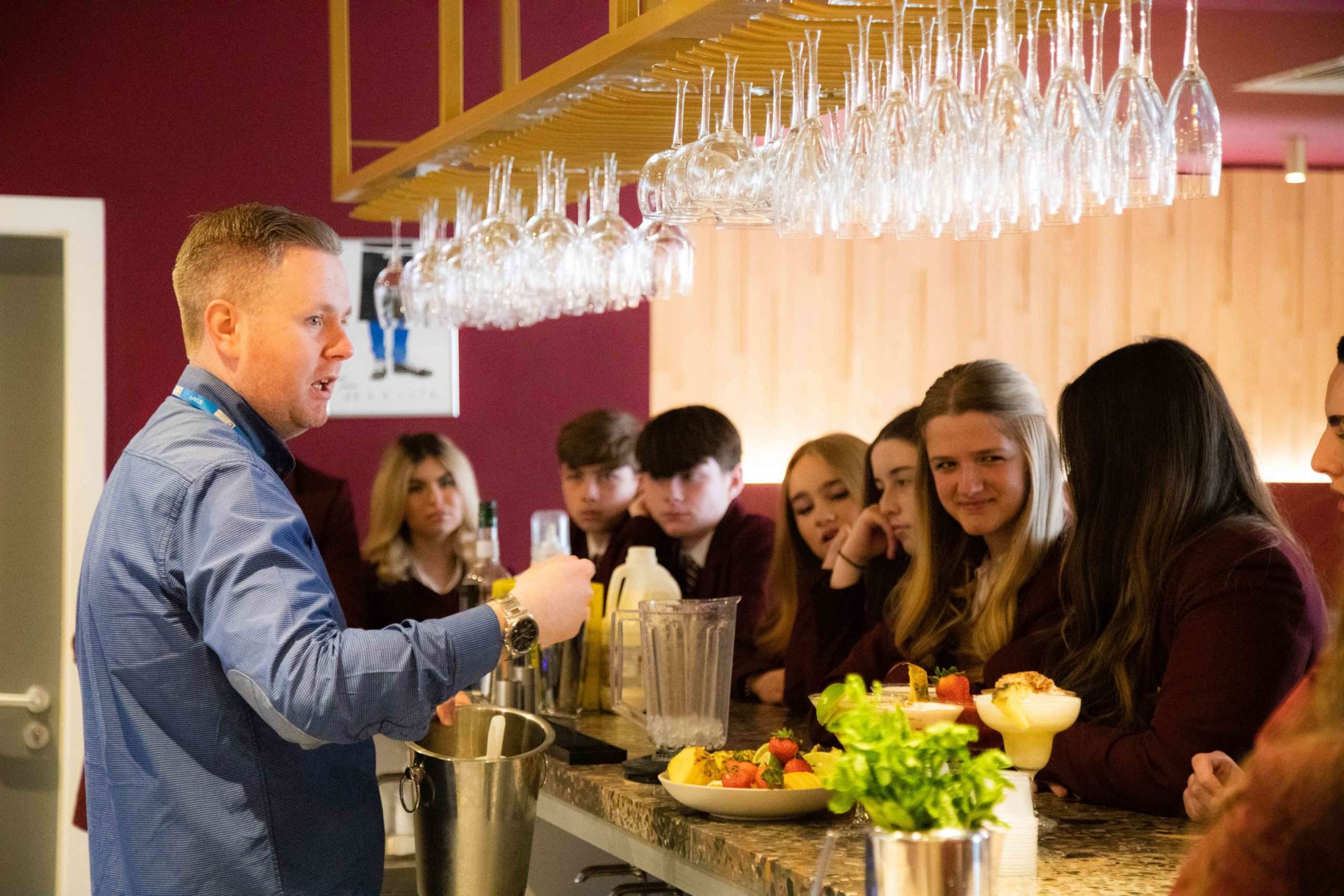
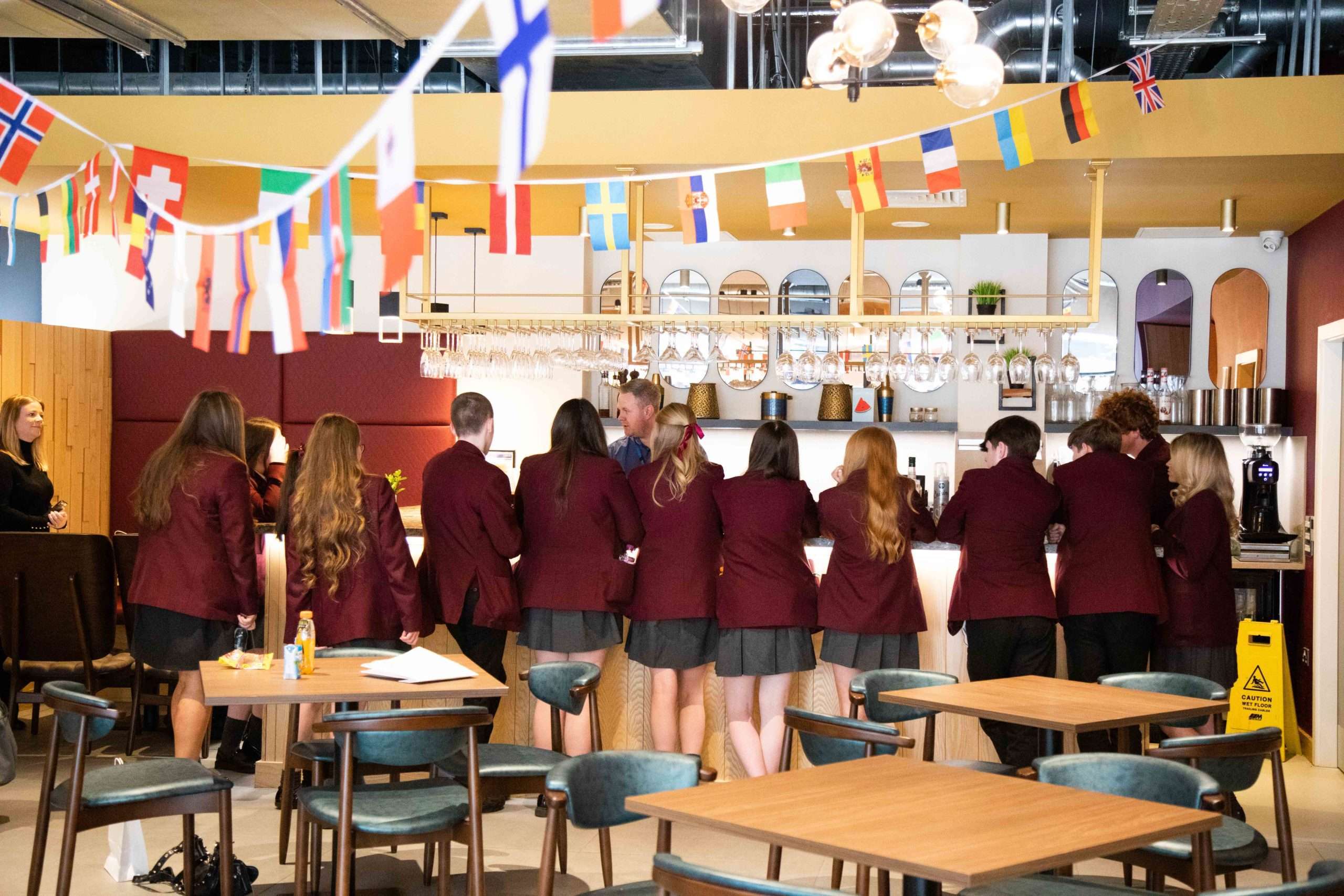
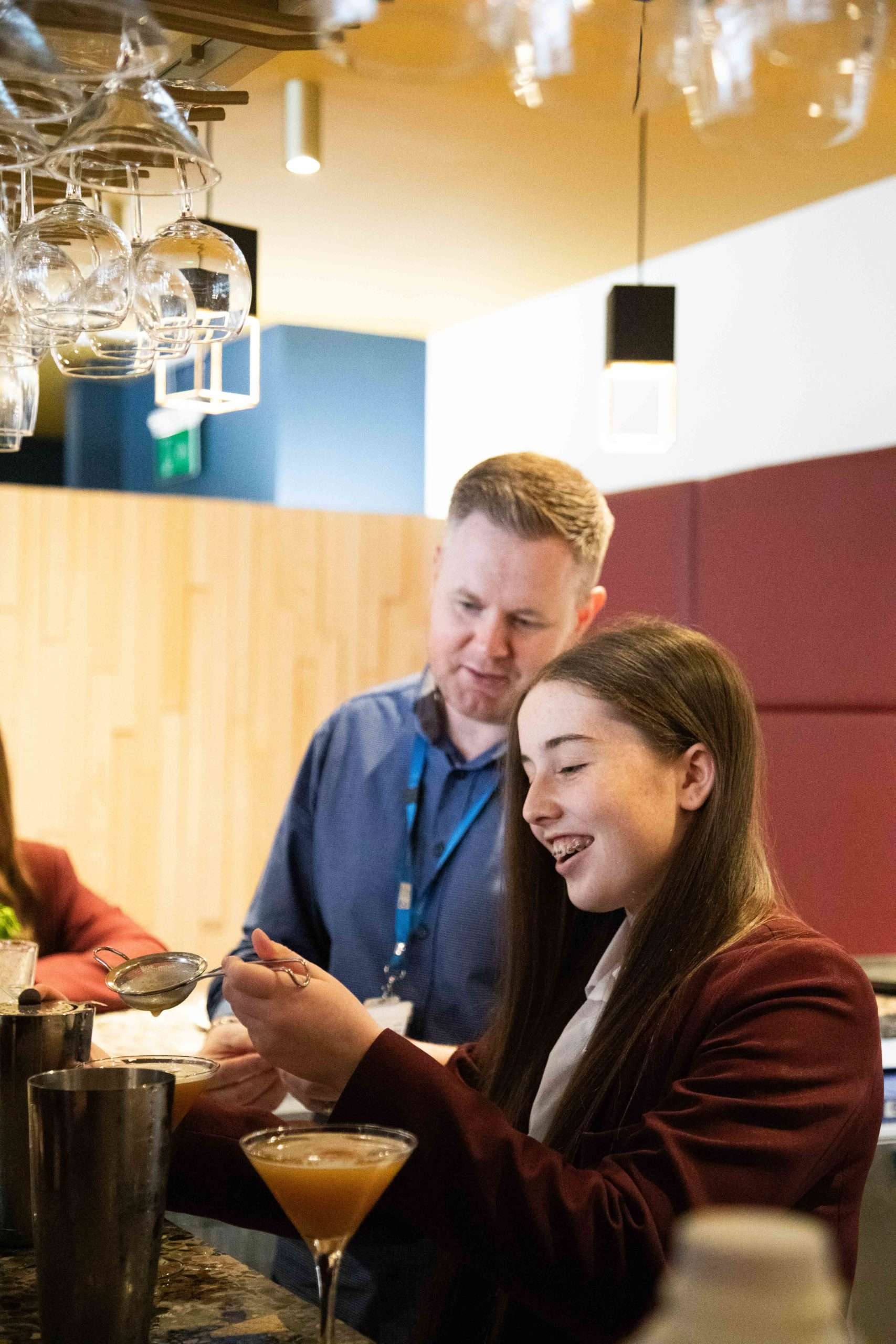
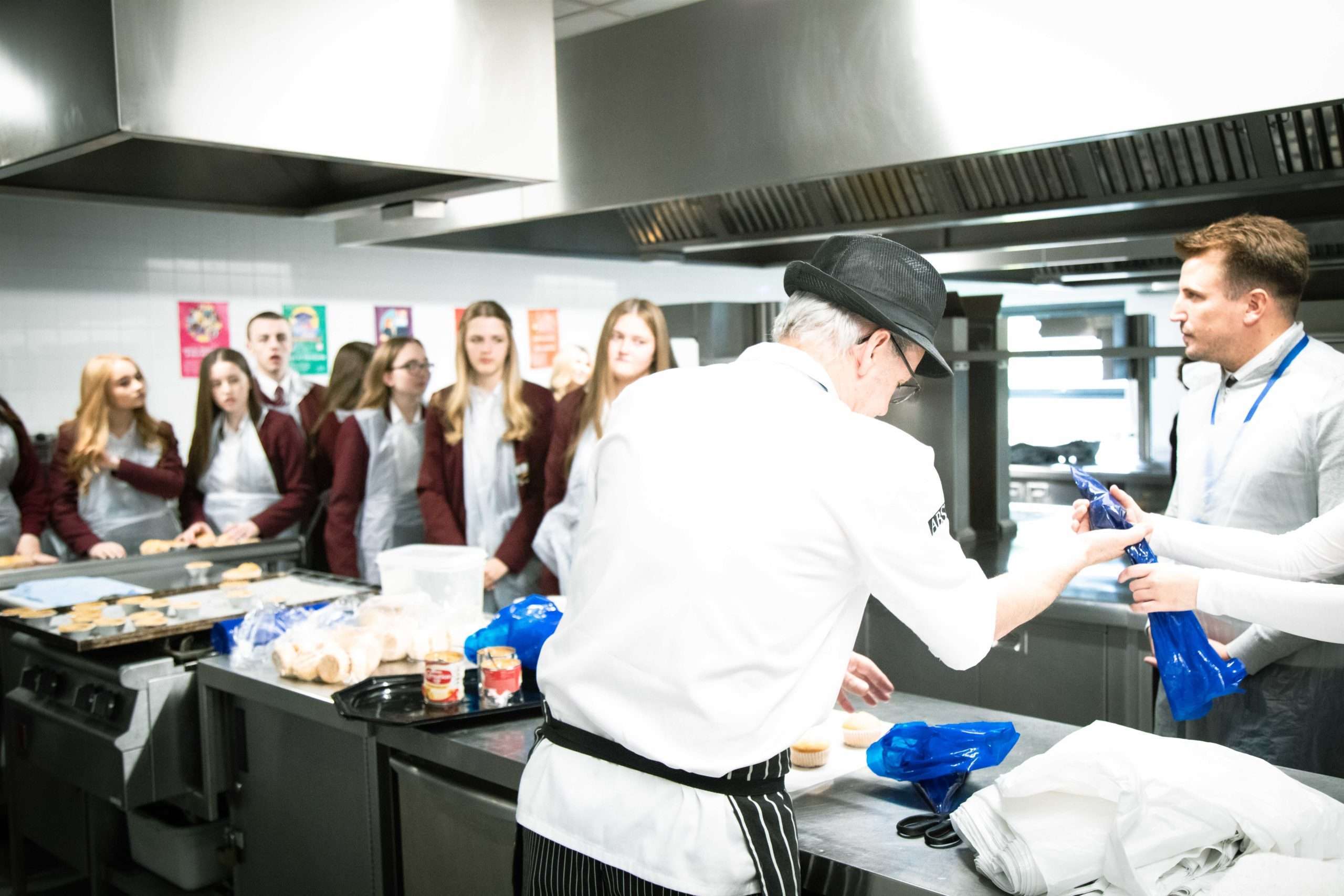
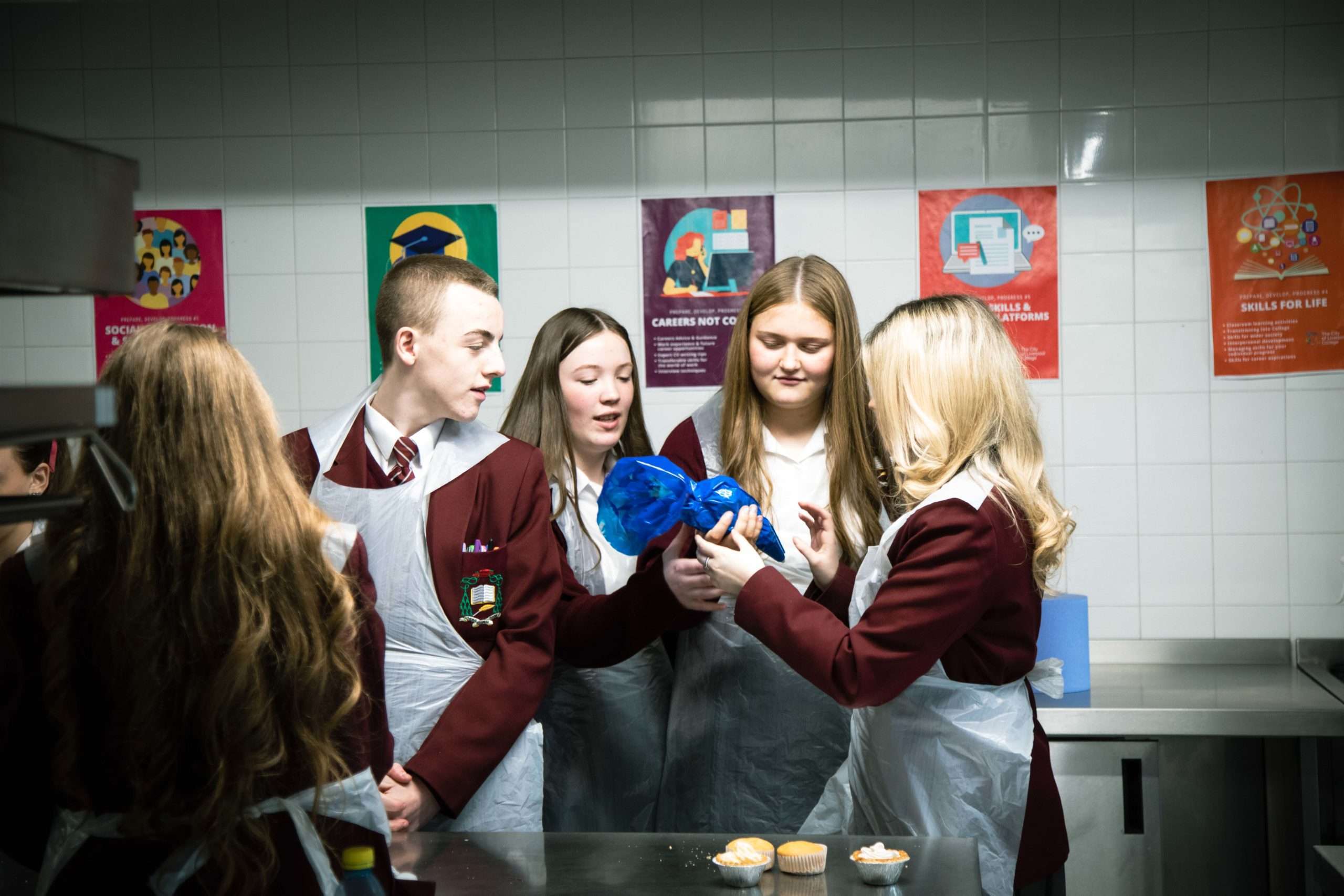
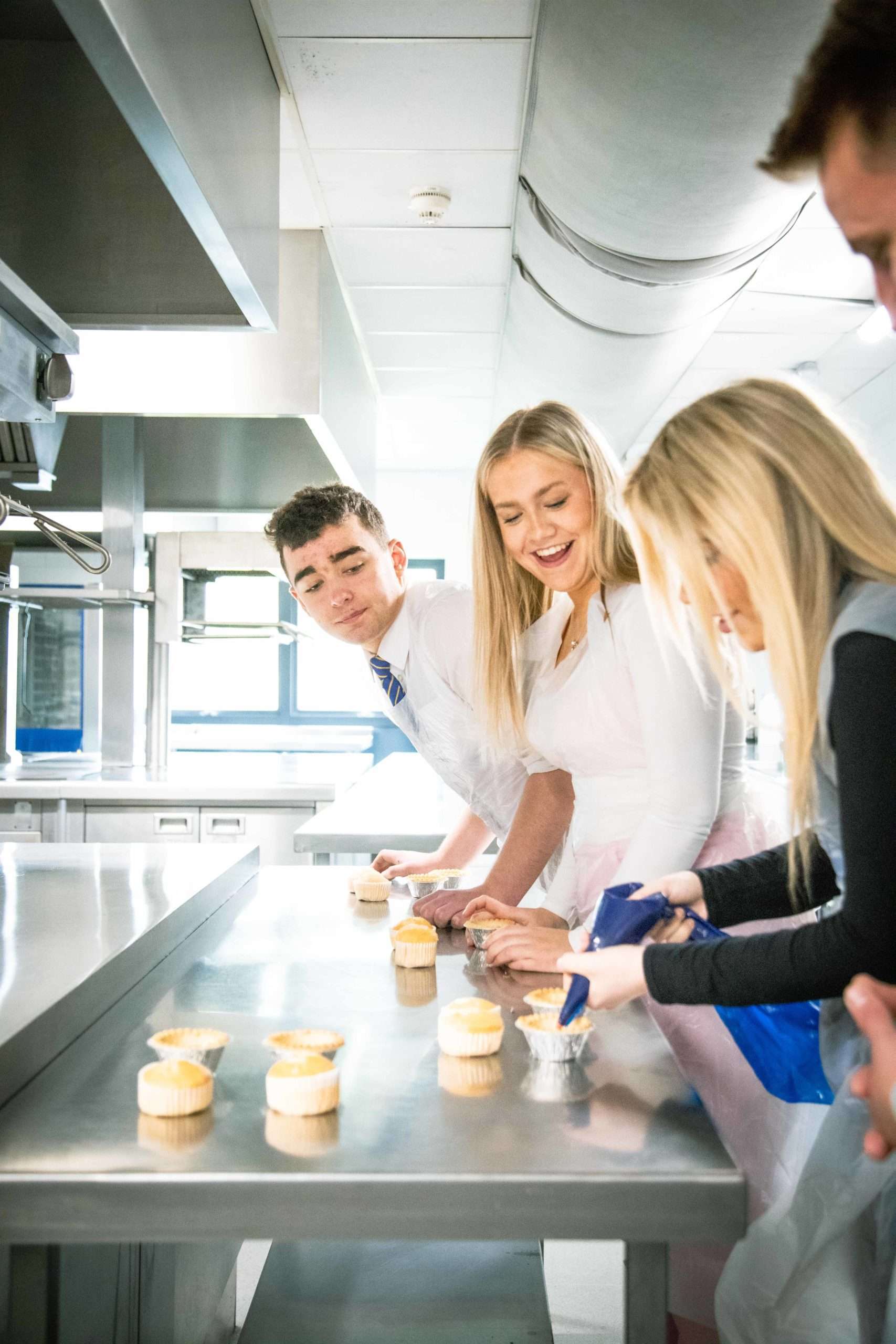
We welcomed pupils from across the city to our Duke Street campus on 26th April. They had the opportunity to take part in a number of practical workshops, alongside inspirational talks from influential employers working within the Visitor Economy sector.
We were delighted to host the next generation of talent and inspire young minds to think about their futures in this exciting industry!
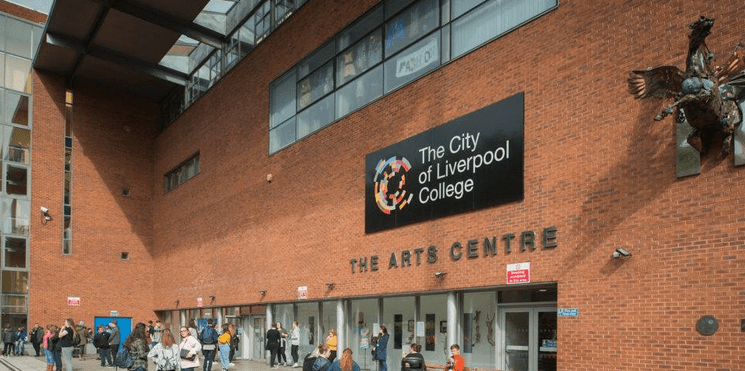
The Arts Centre is set to host a series of careers events for young people interested in the Creative and Digital sector (9 & 10 May).
Pupils engage in several practical workshops with specialist staff in Creative Graphics Design, Photography and Digital IT. They’ll also take part in presentations by creative entrepreneurs from the Creative and Digital industry, followed by a Q&A session with the employers about specific careers and pathways in their sector.
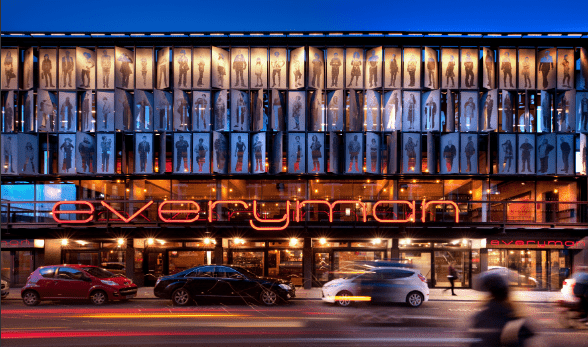
Join us to explore a careers event for young people interested in a career as a ‘Backstage’ professional.
The event features a number of practical workshops alongside inspirational talks from influential employers working within in a back stage career. Students will have the chance to work with specialist staff in Theatrical Make-Up, Costume & Set design, Lighting and Sound & participate in a tour of The Everyman Theatre.
The day is divided into a number of practical workshops and attendees will have the opportunity to select 2 of the 4 workshops (see below) and will attend in either the morning or the afternoon session. The students will enjoy presentations from creative entrepreneurs and have the opportunity to ask questions about specific careers and pathways.
Attendees are required to book in advance of the event and to arrive on time. To book a place or find out more, contact Colette Whelan, colette.whelan@liv-coll.ac.uk.
Culture Liverpool – College hosts Eurovision events in lead up to big day day
Uncover Liverpool – College to host a range of Eurovision events
Liverpool Echo – What’s On – CoLC performance on 12 May
Liverpool World – CoLC Performance on 12 May
The Guide Liverpool – CoLC performance on 12 May
Secret Liverpool – Eurovision Theme Evening at Academy Restaurant

The new Visit Liverpool/Eurovision mobile app is now live. It’s got everything you need to get the best Eurovision + Liverpool experience.
Meet the College’s HR Recruitment team at the Learning Exchange Café in Roscoe Street on Thurs 27th April from 4.30 – 6.30pm.
Heads of School and hiring managers from across the College will be in attendance to speak to staff, students and external visitors about current and upcoming permanent vacancies, bank staff opportunities and recruitment across the College.
If you or someone you know would like to learn more about the opportunities available, please join us on the night. No need to register, just turn up!
If you can’t make it to the event but would like further details, email: recruitment@liv-coll.ac.uk
Check out our current vacancies HERE
Cancer patients at The Clatterbridge Cancer Centre benefit from student-made virtual reality video.
Residents across Cheshire and Merseyside, and the surrounding areas who are being treated for cancer will now be able to see what to expect ahead of their first appointment, thanks to a new virtual reality video produced by local students.
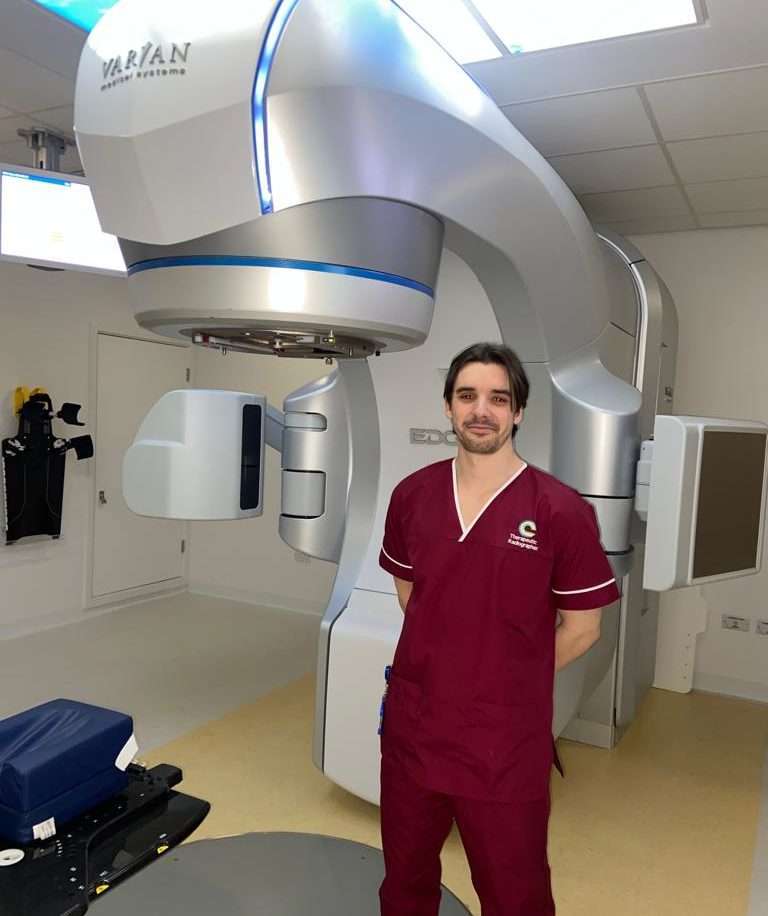
Patients at The Clatterbridge Cancer Centre in Liverpool are now able to access a virtual tour of the Radiotherapy Department, produced by 80 Computer Science Digital (Level 3) students at The City of Liverpool College, so they are better informed and prepared for their first radiotherapy appointment.
Therapeutic Radiographers at Cheshire and Merseyside’s specialist cancer Trust, joined forces with the students inSeptember 2019, who set out to improve patient experience by giving patients and their families insight in to what to expect when they attend their first appointment. The video was created for The Clatterbridge Cancer Centre – Liverpool, the Trust’s flagship hospital which opened in 2020, and includes 3D visual representations of finding the radiotherapy department, signing in, how the changing facilities work and what to expect when entering the treatment room.
You can watch the video below…
The concept for the video was developed when planning for the new hospital and was part of a wider project to enhance patient experience. It was established not only for the benefit of patients but also to deliver social value by offering hands-on work experience for young people.
Students involved said: “We are all so grateful to have been given the opportunity to be part of such a wonderful project, working with the hospital to help patients in the local community, all whilst gaining valuable industry work experience.”
The Radiotherapy team were conscious that patients often feel anxious about what to expect when coming for their first appointment and found that some patients have concerns about the unknown aspects of hospital visits, such as finding their way around and knowing what to expect from their first treatment appointment.
The virtual reality video aims to reduce the potential for anxiety and stress, by introducing patients to the hospital, the Radiotherapy Department and one of the Radiographers, Tom Cummings, virtually.
Nicky Hutton, Radiotherapy Advanced Practitioner, who led the project for The Clatterbridge Cancer Centre, said: “I would like to thank everyone involved in this project. This virtual tour aims to provide patients with key information so that they can get that feeling of ‘I’m happier now that I know what is going on’ earlier in their treatment journey. The whole team are really excited about this virtual tour and the impact it will have on our patients.
“As a Trust, we are committed to continuously improve the service that we provide to our patients. We acknowledge how daunting it must be for our patients attending the hospital for the first time and hope that this video will answer some of the common questions they have when they first begin their radiotherapy treatment.
“Patients who have already seen the video have mentioned how it put them at ease and we hope it will go on to do the same for others.”
It is hoped the video will become part of a collection of resources that are developed for other departments at The Clatterbridge Cancer Centre – Liverpool and Trust wide, such as chemotherapy, to improve patient experience in other departments.
Students celebrate first RISE programme awards in mental health and wellbeing
Congratulations to a group of students from across the college curriculum who were awarded certificates after completing the first ever ten-week RISE Resilience programme last week.
This positive psychology course was created by former educator and positive psychologist, Liz Folan, to help students who feel overwhelmed with everyday life and studies find ways to overcome their stress and anxiety and to ultimately flourish.
Over the course of the programme, students are taught coping techniques and equipped with actionable tips and workable psychological tools to help navigate life’s challenges and become the best version of themselves they can be.
Liz said: “The results have been phenomenal! Students have reported improved self-esteem, relationships, motivation and overall mental wellbeing, as well as a significant decrease in negative emotions such as self-criticism and worry. They have also found strategies to reduce their critical inner voice, which has resulted in a marked improvement in attendance and engagement, alongside a renewed passion for their academic courses.”
The RISE Resilience programme is expected to sign up a new group of students in the near future.
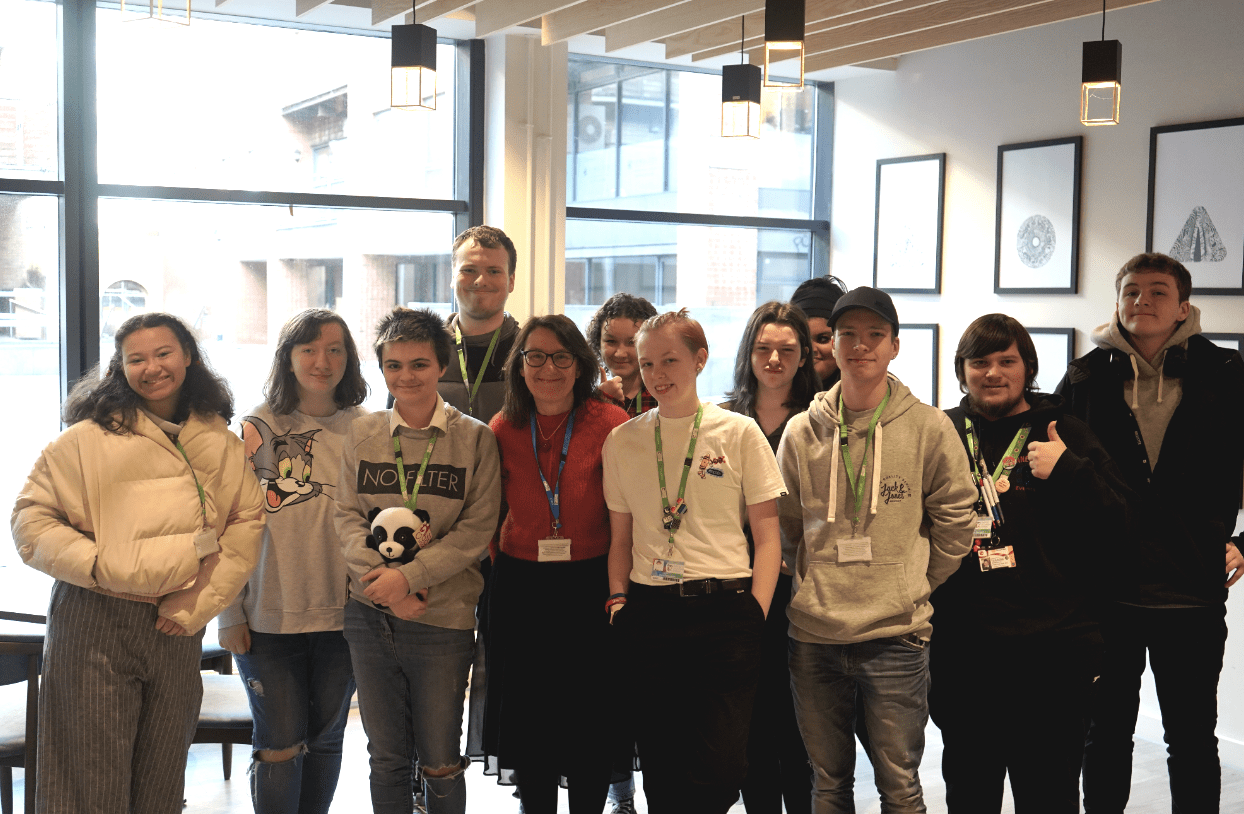
Anderson:
“I enjoy learning new things and wanted to feel better about myself, as I feel low by myself in this country with nobody to talk to. Liz gave me advice about that and to wake up and be strong, healthy, taught me how to reach my goals, and that nothing can stop you. I feel much better about myself as a person, with a stronger mindset and like nothing will hold me back now. I will work hard to be where I need to be.”
BeeBop:
“I learned loads of stuff about Mindfulness, the way our brains trick us into believing negative thoughts that aren’t true, the neuroscience behind it and much more. But the most important thing I learned is what my character strengths are – before RISE, I never even realized that I am a very forgiving person, and I probably wouldn’t have recognized it in myself without RISE! I also find it easier to spot the good things in my life now; what I’m doing right, instead of obsessing over the negatives. In my experience, RISE helps cultivate a positive outlook on life, which is so invaluable.”
By Lindsey Meadows.
As Head of Apprenticeships, I’m here to bust some of the myths surrounding apprenticeships and highlight the many benefits they offer.
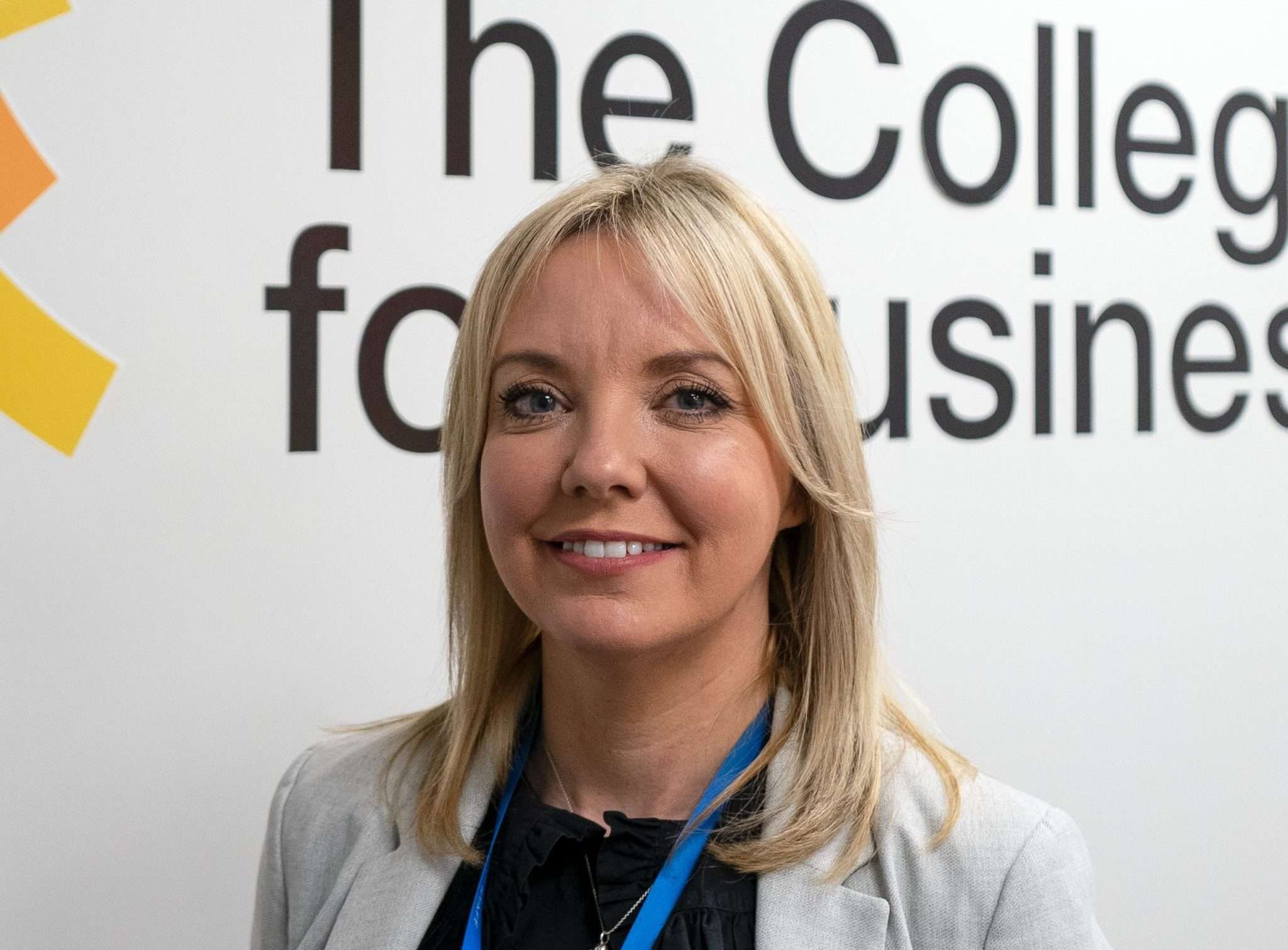
Myth #1: Apprenticeships are just for people who aren’t academically inclined
This is far from the truth. Apprenticeships are a great option for anyone who wants to start or further their career, regardless of their academic background. They offer a unique combination of on-the-job training and academic learning that allows individuals to develop both their practical and theoretical skills. Whether you’re looking to start a new career or improve your current one, apprenticeships provide valuable hands-on experience and industry-recognised qualifications.
Myth #2: Apprenticeships are only available in manual trades
Apprenticeships are available in a wide range of industries, including but not limited to construction, engineering, hospitality, IT, finance, hairdressing, and barbering. With the increasing demand for skilled workers in many industries, apprenticeships are becoming more and more diverse, allowing individuals to pursue their passion and interests in a variety of fields.
Myth #3: Apprenticeships are only for young people
While apprenticeships are often associated with young people just starting their careers, they are not limited to a specific age group. Individuals of any age can benefit from an apprenticeship, whether they are looking to change careers, upskill, or retrain in a new field. Apprenticeships are designed to be flexible and cater to the needs of different learners, and many employers are open to taking on mature apprentices who bring a wealth of experience to the workplace.
Myth #4: Apprenticeships don’t lead to good career prospects
This couldn’t be further from the truth. Apprenticeships provide a solid foundation for a successful career and are highly valued by employers. Not only do apprentices gain valuable hands-on experience, but they also develop a range of transferable skills that are highly sought after by employers. Many of our apprentices go on to secure permanent positions within the companies they trained with.
Myth #5: Apprenticeships don’t pay
One of the biggest benefits of an apprenticeship is that you get paid while you learn. Apprentices earn a wage while gaining valuable on-the-job experience. This means you can start building your career and earning a living, all while gaining the skills and knowledge you need to succeed.
In conclusion, apprenticeships offer a wealth of opportunities for individuals of all ages and backgrounds to develop their skills, gain valuable experience, and launch successful careers. I encourage anyone considering an apprenticeship to explore their options and take advantage of this valuable opportunity. To find out more, visit: www.liv-coll.ac.uk/apprenticeships
Journalism student celebrated for top NCTJ exam resultsJournalism student, Conal Cunningham, has been awarded with the Newsquest essential journalism prize, for achieving some of the best results in the country in the 2021-22 NCTJ Diploma in Journalism exams.

A total of 8,255 NCTJ (National Council for the Training of Journalists) diploma exams were sat throughout the academic year, with Conal achieving the best grade in the country for the Essential Journalism exam and receiving a cash prize of £250.
For the past 18 months, Conal has been working as a trainee journalist at the St Helens Star and Leigh Journal, reporting on a variety of people, court cases, council meetings and charity events.
We spoke to Conal to find out more…
How does it feel to have achieved the best exam results in your year?
“I’m thrilled to have achieved the best grade in the country for my Essential Journalism exam. It’s not something I was expecting but it’s been great to have been recognised and congratulated on the award. It shows I’m on the right path!”
How did the College prepare you for your exams?
“The college were thorough in preparing me for all the journalism exams I had to take. I wasn’t familiar with too many of the modules, so course tutors Joanna and Kate really helped get me up to speed, despite it being a fast-track course.”
What did you enjoy most about your time at the College?
“As I had already undertaken a degree and masters at university, I was really pleased that the College offered a fast-track journalism course so I could quickly get the qualifications I needed. It was a fairly laidback but also very thorough course with supportive tutors.”
Have you enjoyed working at the St Helens Star and Leigh Journal?
“I’ve really enjoyed working for the St Helens Star and Leigh Journal. It’s given me a good platform to start my career and the opportunity to interview a range of people on a variety of topics and events.”
What ambitions do you have for the future?
“I’m not sure what’s next but I do enjoy the local aspect of journalism and getting to be a voice for ordinary people in the community. In the future I could perhaps specialise in a specific field of journalism.”
Would you recommend the NCTJ course to other aspiring journalists?
“I would definitely recommend the NCTJ course and the College to aspiring journalists. I wasn’t sure what I wanted to do after university, so it was a great way to quickly get up to speed in journalism and gain the necessary qualifications to start my career.”
If, like Conal, you’re interested in a career in journalism and would like to find out more about our fast-track NCTJ accredited course, click here.
Former student in final line-up of Ramsay’s Next Level Chef TV ShowWe caught up with former student, Tobias (Toby) Caswell-Jones to find out more about his life and work since graduating from the professional cookery course at The City of Liverpool College in 2022. He gives us the background on what led up to him securing a place on Gordon Ramsay’s popular ITV1 show, Next Level Chef, which came to our screens on Wed 11th January.
“Growing up, I always enjoyed cooking; I wasn’t particularly good at it, but I enjoyed it. It always intrigued me how chefs could just look at ingredients and create such huge amounts of flavour. My mother worked in a bakery for a long time, and my grandmother spend most of her working life in a bakery. As it turns out, my grandfather was a chef in the Merchant Navy, and the entirety of my dad’s side of the family are chefs in Ireland. So, unbeknownst to me, cooking was in my blood!
“It was really at the first tick of the COVID pandemic that I started cooking more and more frequently, and I found that once I put my head into it I was pretty good! It was then I decided that I wanted to cook, and applying to college was the next step.
“I decided that with only bar management on my CV, the best way to prove to a kitchen that I can cook – and I wasn’t just some time-wasting kid – was to attain a qualification in cooking. I chose to do an NVQ 2 in Professional Cookery. Little did I know how much I would truly learn about food and the inner workings of kitchens while doing my course, and this little bite extra to what I was expecting is what pushed me to do my Level 3. To be able to learn new dishes and techniques, some that I’d never even heard of, was an opportunity I couldn’t pass up. The College developed my repertoire and knowledge by amounts I can’t even measure. If it wasn’t for the Level 3 course, I wouldn’t be the chef I am today.
“Cementing the basic techniques of roux-based sauces, together with the knowledge of what it takes to create flavour in the Level 2, is what mattered most. A plate can look pretty and be ‘instagrammable’ but if it doesn’t taste of anything then it’s pointless. Flavour is the number one priority when creating food, and that’s what the college taught me. Then, following on with the Level 3 and learning more complex dishes, such as the knack of creating a good jus, and dispatching of lobster and crab, as well as being given the opportunity to work with lots of interesting ingredients, put me ahead of most chefs my age – even if I’ve only worked with ingredients once before, it gave me an advantage over someone who had never worked with them before! All the tutors on the cooking course really saw my potential and wanted to nurture me into the chef I am now, the passion these staff have for the next generation of chefs is admirable, they want to see us succeed, and to be able to give them that is an honour.”
“Since finishing College, I went on to become Sous Chef of the two-rosette restaurant, Mustard and Co., in Crosby. But I will say that to progress so quickly is something that wouldn’t have happened without hard work, determination, and sheer willpower. But having the knowledge that College taught me, did put me ahead of the mark, and allowed me to express my capabilities in the kitchen; giving me the freedom to do what I want to do. I currently work in Queens, Liverpool’s new wine bar and bistro, where we do absolutely everything properly and from scratch. It’s with great thanks that I was set up with the best advice from my tutors about commercial kitchens and the ins and outs of the industry, that I couldn’t have done so much in such a short time.”
Gordon Ramsay’s ‘Next Level Chef’ TV show
“Having the opportunity to compete and participate in Next Level Chef was an opportunity I will never forget, nor will I ever take for granted. To have the chance to be mentored personally by the biggest chef in the industry, Gordon Ramsay; his former protégé and starred chef himself, Paul Ainsworth; and American powerhouse Nyesha Arrington. It’s something I’m never going to forget.
“I learnt so much on my journey of Next Level Chef. From going into the competition with a lot of imposter syndrome, to coming out on the other side with a whole new sense of confidence and encouragement in my cooking ability, has transformed me both as a chef and as a person. An experience like Next Level Chef has transformed me. Thanks to Gordon, Paul, and Nyesha, I can finally cook the way I wanted to, and I have the faith and knack in myself to be able to cook in such a way.
“To anyone who is thinking of an opportunity laying in front of them, I implore you to take it. It was a fleeting moment, but taking that first step into Next Level Chef was the best thing I could’ve done for myself, and I encourage any young person to do the same.”
“To anyone thinking of taking the culinary course at the College, I’d tell you to do it; and do it right now! Many people in the industry tell you that “you don’t need college” and that you “learn everything you need on the job”, but I can tell you now, that is not the case. There is a reason why I am where I am in such a short period of time, and that is definitely, in part, with thanks to the college, along with a lot of determination. You gain so much that you wouldn’t otherwise have learnt, and that expansive repertoire helps you tenfold in the industry.
“To current students at the College, what I must tell you is keep going. It’s hard work being in the industry; there are lots of downs, many issues, and a lot of adversity you’ll have to overcome; but at the end of it all, it definitely is worth it. The food industry is the backbone of society, and being able to give an amazing experience to everyone who walks through those doors is an honour and a gift. Everything works out, so keep going, listen to your tutors—they know a lot more than any chef I’ve worked under – and enjoy the experience while you can.
Plans going forward, I hope to keep cooking great food for customers who appreciate it. That’s all I’ve ever wanted to do, cook food. In my current position at Crosby Wine Bar and Bistro, I’m allowed to cook the way I want to cook and cook using great ingredients and produce.
The main goal is to become a Head Chef within the next few years, and be able to put my own personal mark on the Liverpool food scene, and perhaps even a mark on the UK, but as long as I’m serving tasty, heart-warming food that’s all that matters.♦
Link to information about the Next Level Chef show
